#if your response to seeing criticism of racist tropes is to write that trope but harder and worse
Text
something tangential to the enforced motherhood post i reblogged but while dc's contention with this concept is pretty horrid and distasteful in general what i find worse is the fan reaction in batman circles, specifically with regards to talia and selina. on one hand, you have the very obvious projection of a racist and xenophobic trope onto talia where she is stripped of any and all personal agency and to the point her character can never be severed of motherhood or even worse only viewed as an abusive party within the concept. fans not only project their own experiences of abuse onto her despite these projections being contrary to her own ambitions and writing prior to her character assassination; they also, in the event they don't want her to be an abusive mother, decide to relegate her to a static concept of motherhood where she has no existence outside of raising damian and where there isn't even a possibility of toying with the idea that she may not have actually acquiesced to the concept of motherhood to begin with. i'm always so surprised by how little people seem to contextualize the life talia led as lex corp ceo with her potential role as a mother. how would she be able to live that kind of isolated, purpose-driven life where she could set every personal desire aside for the sake of her duty to the world if she was expected to parent a child first? this is a rare viewpoint i've never really seen expressed but one reason i find morrison's portrayal of bruce and talia as parents to be really ironic is bc i think the roles are nearly reversed. at that point in her life and with the slew of burdens and responsibilities on her shoulders i honestly think talia (regardless of what immense affection i'm sure she would have for her own child) would be the one who had trouble acclimatizing to her role as a parent, versus bruce who made it his intent for several years to parent various children and when he found out talia was pregnant impliedly committed to shielding that child (and her) from violence and a vigilante life at all costs. it's a narrative thread i really would have loved to see explored but on a practical level would likely be impossible to do not only bc of dc's handling of asian mothers and their racist degradation due to their juxtaposition against white fathers, but also bc of dc and dc fans' constricted view of motherhood to begin with. either you're a good mother or you're a bad mother. there's no room for the in-between nuance of possibly loving your child but not knowing how to balance that responsibility bc of what you view as important responsibilities you have to others
on the other hand, you have dc fans' engagement with selina's relationships with younger orphans and sex workers in her community. this is a really interesting one to dissect in light of ship wars specifically bc while i agree that there isn't any sense in having selina act as a mother-figure to bruce's children i also don't really agree with people's justification that she's not a "motherly" character. it's once again a very striking example of the restricted perception people have of motherhood or of behaviors commonly associated with that role, bc i don't think people who say this are really criticizing her ability to be a mother at all. what they're actually criticizing is her capacity to care. there's oddly all too many people who believe selina's anarchy or more self-serving nature is antithetical to any expression of compassion. so what you end up having is a phenomenon where one group of fans is eager to see her co-parent with bruce and another group of fans is eager to see her severed of any significant connections at all bc it somehow fits her "villainous" nature. and all-in-all, from both sides, her relationships with kids like holly and arizona are completely obscured. there's no room made to discuss how selina can possess deep empathy for young people whose experiences she identifies with and that she can care for them and even take them under her wing without necessarily wanting to adopt them, but that if she wanted, maybe she would adopt them. i honestly feel like that was the direction alan grant and doug moench were going in with arizona in the early 90s had mary jo duffy not abruptly excised arizona bc, like a lot of fans, she thought having significant emotional attachments was antithetical to the catwoman persona albeit there was no actual canon to back that notion on a behavioral level. i don't think selina has to be a mother, but i also don't think it's an infliction of stereotypical gender roles on her to imagine a scenario where she might adopt a stray, esp if that scenario occurs within a context where she is still independent and forging her own way of life and liberty. if anything, taking care of holly and arizona were some of the highest points of her narrative, bc they were a looking glass through which to explore selina's capacity for love and mercy, in spite of all of the trauma and abuse that she had to suffer at the hands of others
to me, the problem with dc's contention with motherhood is not so much that it's attached to these women at all, but that the definition of motherhood used is entirely framed with a heteronormative understanding of the family unit, despite the reams of potential to explore characters like talia and selina as independent figures acting outside of that traditional hierarchy
#to be deleted#does this make sense. no. but i think about it a lot and wanted to put it down somewhere. so
53 notes
·
View notes
Text
Writing Doesn't Happen in a Void:
End Racism in the OTW
I read @saathi1013's excellent work and it inspired me to write something similar but with a different focus. She grapples with the relationship of the individual to the fandom as a whole which is at the heart of the End Racism at the OTW protest. You should read it, too.
However, it did put me in mind of a defense a lot of people employ about their writing. They argue that their fandom writing can't possibly be racist because they don't see race as involved ("Don't bring race into this!") or they insist they were only commenting on a character's specific and particular behavior. It always puts me in mind of Through the Looking Glass.
"When I use a word," Humpty Dumpty said, in a rather scornful tone, "it means just what I choose it to mean - neither more nor less."
This is an absurd statement from an absurd character in an absurd setting. If he encountered them, Lewis Carroll might not have interpreted the words "communication theory" the same way we do today, but he understood that to complete an act of writing it requires more than just an author. It is an action which also requires a medium, a cultural context, and a reader.
My perception is that the root of the problem with OTW's response to racism is that the organization holds it as a basic premise that fanfiction should be evaluated as an isolated creation, which its authors conjured from their own experiences with canon and that readers are obligated to only approach these works after shedding all personal and cultural context. This premise manifests in the organization's tacit approval of the stultifying and banal idea of "Don't like; Don't read." It's a simple concept -- and more importantly it's a defense that requires no effort -- but it fails logically. An author can propagate racist ideas without intention, and if they do, they're not going to label for it! And racism can be so subtle that a reader might not become aware of its presence immediately while reading a work. Most people are not precognitive.
I hope to Heaven that I don't have to explain how exposure to racism damages people, but I do suspect it might damage them even more if their reactions to it are met with "That's your own fault!" This is essentially what the OTW is saying when it promotes the idea that authors should not have to be exposed to negative reactions to their own work and that they as an organization aren't complicit in an individual author's racism when they maintain an imaginary neutrality. Thus they see every encounter a reader has with racism in fanworks is the reader's own responsibility, as if they encountered it through their own negligence.
I've encountered this type of thinking so many times. I've pointed out how a popular trope is racist in the past only to have the author come back with "I'm doing this for free and I didn't mean for it to be racist, so if you don't like it then leave." What they fail to grasp is that it doesn't matter if I leave; the work is either tainted by racism or it isn't. The author won't -- and literally can't -- make that determination for themselves if they are constantly encouraged to see all negative criticism as unfair, unethical, and unnecessary, and if they see the OTW, the publisher of their stories, as fighting tooth and nail to protect them from all consequence.
And, as a customary disclaimer, I'm not arguing for censorship, but there are responses, as I've said before, falling between a censor regime and dogged indifference.
41 notes
·
View notes
Text
Heeeyy so tuesday was A Day so I ended up trying to write this over the course of the week and posting way later than originally planned. @biceratops7 and @ourflagmeansgayrights thank you for your patience hearing back from me and with this whole dialogue. For context, this is in response to this thread.
I've had to come back again and again to this post because, on top of other things, I kept explaining the difference between structural and interpersonal racism and then getting distracted by my visceral responses to this conversation. Pero like I don't want to go over systems of oppression 101 stuff because it feels patronizing. I also don't wanna rehash the ways in which the doxxing and the targeted harassment and the rhetoric make me feel.
So I wanna try establishing a common ground as fans who care about racial justice and queer liberation before I proceed here. Please let me know if there's significant caveats/disagreements about any of the principles in the list below.
I realize that most people join fandom looking for levity and connection and creative expression and none of this shit should be that deep. But right now we're talking about structural racism and real, concrete, preventable harm being done to people in our fandom community. I think it's safe to assume that everyone who's invested in "the izcourse" (lol) believes that these things deserve to be treated seriously.
After eight months of being active in the ofmd fandom (especially within the "izzy side"), I'd describe our current guiding principles around racism as follows:
OFMD is special because of its loving, complex, and imaginative portrayal of nonwhite, lgbtq characters as well as its diversity behind and in front of the cameras.
The peace of mind and physical safety of Black, Indigenous, and People of Color (BIPOC) in fandom are important and worthy of protection.
We are aware that because we live in a racist world and because fandom in general is overwhelmingly white, BIPOC often experience racist microaggressions from other fans, which poses an obstacle to our enjoyment of fandom.
We are also aware that when BIPOC call out these microaggressions or racist tropes in the source material+fanworks, we are often met with backlash that may include overt racist harassment and/or abuse.
In order to reduce racist microaggressions and to help make the fandom a safer space for nonwhite fans, it's vital that everyone (no matter their race) takes action. Some ways that fans take action are:
a. calling out racist microaggressions.
b. white fans sharing the burden of basic antiracist education to prevent BIPOC from burning out and receiving racist backlash.
c. defaulting to listening, reflecting, and adjusting behavior when someone points out concerns around potentially racist behaviors.
d. pointing out racist trends and tropes in fanworks+the source material (whitewashing, white savior narratives, cultural posturing, etc).
e. sharing, creating, and studying antiracist educational resources.
I'm approaching my responses to the messages below with the understanding that the 5 principles described above are indeed antiracist, that they form part of the general ofmd fandom culture, and that the tactics listed under principle 5 are being regularly practiced by nonwhite and white ofmd fans alike. I believe that, generally speaking, these principles and tactics are beneficial to BIPOC fans.
Now, on to the replies.

@ourflagmeansgayrights
I think that this is a key point of the mess we're grappling with. I want to first restate that, in my experience, calling out racist trends has been an accepted practice in ofmd fandom for the better part of 2022 (see principle 5). That said, even though I've never witnessed it, I'm predisposed to believe claims of overt racist harassment against nonwhite fans for openly criticizing Izzy--such is the nature of racism. But I would be remiss not to point out that the overall ofmd fandom culture has evolved in favor of embracing explicitly antiracist attitudes. I'm sure that we owe this to nonwhite fans who took on the heavy burden of promoting antiracism during early fandom days.
Calling out racism in fandom is NOT the problem.
The problem is that BIPOC in the "izzy side of fandom" have been subject to severe, concrete, racist, escalating harm that goes beyond the daily racist fuckshit that makes up the ether of our lives in AND outside of fandom. What's worse, abusers justify their actions by invoking tactic b (pointing out racist trends and tropes in fanworks) and then wrapping it up in "izzy critical" rhetoric.
Assuming best intent and forgoing my personal thoughts about "izzy critical" meta, these are my questions about the impact of this "type of Izzy fans":
What are the specific qualities and behaviors of “Izzy fans who make bipoc feel unwelcome in the fandom” (as biceratops 7 wrote below)?
What is the nature and extent of the harm they cause? What tactics have worked in reducing the negative impact of this "type of Izzy fan"?
The questions above also address the first paragraph and are tied to the last question in the screenshot below.
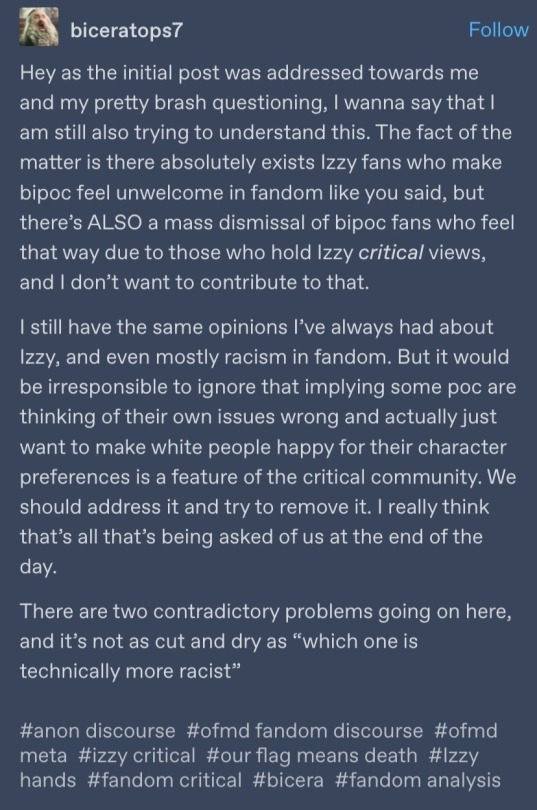
@biceratops7
“But it would be irresponsible to ignore that implying some poc are thinking of their own issues wrong and actually just want to make white people happy for their character preferences is a feature of the Izzy critical community. We should address it and try to remove it."
I think you hit the nail on the head here and I truly appreciate you questioning the point of disparaging BIPOC fans for disagreeing with "Izzy critical views."
There are two contradictory problems going on here, and it's not as cut and dry as 'which one is technically more racist.”
Yeah :/ such is the insidious nature of racism. Which is why the question "is x technically more racist than y" is not that helpful when it comes to strategizing for racial justice campaigns: looking for concrete, measurable things to work on is where it's at.
So instead of "is the segregated westside more racist than the eastside?" we ask "why is there so much lead in the blood of polynesian eastside kids than there is in the blood of white westside kids?" Instead of "is it more racist to force this brown councilmember to resign than to keep him around even though he broke the community's trust?" we ask "what would it take for the councilmember to regain the trust of the black and brown communities he failed? can he even do it?"
In our case, instead of languishing over "is the harm that nonwhite Izzy fans get more racist than the microaggressions that Izzy Critical fans regularly call out?" I propose framing the contradictory problems you mentioned by assigning them to the super weird polarized camps we're working on:
Izzy Canyon*: what are the harmful, racist behaviors coming from our side of fandom that we might be missing or ignoring and how do we address them?
The Izzy Critical Community: "[why is there] a mass dismissal of BIPOC fans who feel [unwelcome in ofmd fandom] due to those who hold Izzy critical views?"
*A lot of us on ofmdtwt affectionately started using "Izzy Canyon" as a silly catch-all for those of us who like Izzy, block liberally, and make+consume lots of NSFW and dead dove fanworks (lots of "minors DNI"s). Even though the "Izzy Critical Community" feels cohesive to me, it's not "my" side of fandom, so I don't think it's my place to define it.
69 notes
·
View notes
Text
alright, i have come to the decision i am keeping this blog up as an archive and leaving the gt tumblr community for the foreseeable future.
when i made my post about chamomile-g-tea’s damaging treatment of my story, gtms, my goal was to acknowledge the situation so i could hopefully move forward and restore gtms/my blog as mine again, without her influence. and while i anticipated backlash, some of the responses were just...downright disturbing. lots of comments echoed a victim-blaming sentiment that i am responsible for the emotional and creative damage done to me by another person because ‘why didn’t you just say no or tell her to stop?’ not only does this ignore the several attempts i did make to express discomfort and set boundaries—which were not respected—but even if i didn’t manage to express a ‘no’, that doesn’t make what happened ok; it doesn’t erase the year of crippling pressure and guilt i lived with and still struggle to shake daily. realizing that so many people in this community think otherwise is just...disturbing. it’s disturbing. that’s the only word i can think to use.
the response to all this does not make me feel safe being here—that’s what this situation has unfortunately showed me: that the audience i hoped to allow to view my reclaiming process would also contain the same crowd who make me feel so unsafe—and why the fuck would i let those people see something as personal as that? why would i let them see anything? it’s made me understand i can’t continue to heal myself and my writing if i am posting it for other people, especially harmful people. and even though it turned out this way, i’m glad i gave it a shot; that i made that post as an effort to see if it was even possible or worth it to restore this space—even if the answer was no! absolutely fucking not!—because it saved me from even more time spent sharing my work with people who do not respect me as a person or a creator. i’m glad i tried, however much it sucked, because it allowed me to understand: it is not just one person in this community i feel unsafe with, but a solid percentage of the community at large that i just cannot healthily engage with, and no amount of blocking will fix that.
but of course this is not the only situation that showed me this community’s true colors—the dismissive or outright aggressive response to the calling out of racism in our tropes has also been deeply disturbing. to clarify, there is no problem in identifying with and finding comfort or catharsis in problematic tropes such as the pet trope, but there is a problem with using that comfort to make others feel unsafe and speak over people of color. and the solution to this trope problem is very simple—generally apply critical thinking skills to the media you enjoy, and tag your shit properly (dead dove, particularly when the giant owner/abuser doesn’t face consequences and/or if the abused/abuser fall in ‘love’—dead dove is not actually currently used in this community, that’s the problem). but rather than taking this as an opportunity to listen and improve, it was instead used as a chance to lash out at and make clear that poc are not welcome in this community and come secondary to the feelings of white creators and readers.
over the last few years, this community has fostered and been exposed for bigotry such as terfs, ableists, racists, etc, and especially in the current political era, this is no longer a community i want to share my work with or even just lurk in. and i know on the surface this community seems progressive, but take a better look and you’ll find members of the community doing and saying…questionable things, or keeping quiet and enabling their friends who do and say questionable things because they would rather be passive and polite than be genuinely kind and compassionate through active accountability.
of course this is the risk you take interacting with any person ever—but it’s especially taxing to look around at such a small, close knit community you know is riddled with these problems and wonder if the people making innocent posts are actually harmful; if they prioritize their comfort over the safety of marginalized people, if they even see you as a full person, and for me, personally—if they are willing to overlook consent to blame you for your trauma and defend the person who inflicted it. it’s taxing to explain basic basic concepts to strangers over and over in a place that prides itself on being a safe space, where people just have fun and mentally escape from irl hardships. it’s taxing to ride out shitty, hateful treatment when you are just simply one person (voluntarily providing free services btw) with only so much energy and fucks to give. it is not worth the strain it puts on you as a person, nor is it your responsibility to sit there and accept it, and i am not the only creator in this community who feels this way. we are fucking tired.
quite simply, this is not a community i feel comfortable participating in or sharing anything with. and that’s a shame, because there are wonderful, creative and caring people here who i have enjoyed sharing this space with, and maybe someday i’ll give this community another chance, but currently it’s just not worth the time of day. and i want to make it clear: my leaving is not simply because of just one person or just one situation—that i could handle—it is the community itself that is the root problem; that continues to be harmful, in multiple contexts—that is the reason why i and several other creators are leaving for greener pastures and more enjoyable communities—or just simply for a fucking moment’s worth of peace, because lord knows you won’t find it here.
#i considered making this post just ‘yea i feel unsafe here i’m leaving’#but i did want to post a clear explanation for mutuals still here n the ppl who come across my blog in the future#instead of leaving it to speculation and guess work#so i wrote a fucking essay lmao#but there are more personal details i didn’t go into bc they’re distressing and some of y’all are straight awful<3#however i will say you are not inside anyone else’s head if they say they feel unsafe it is not for you to question that#anyways privileges to myself and my writing are officially revoked#when i’m ready to share writing it’ll be with close friends in private#and maybe eventually on another site like ao3 but if that happens it won’t be for a while#and if i do post gtms there it will prolly be v different from the version here bc it’ll be the restored and improved version#i hate the version on this site<3#for now i just need to get back into the swing of things bc rn it is. so hard to Think at all#i’ll also be doing things on my fandom account i am just leaving this community bc good lord#if you told me a month ago i’d be leaving this community i’d have been devastated but now?#having seen sm of this community’s true colors one after another?#i don’t give a fuck now#the only thing i feel is relief#the community i thought i was apart of does not exist and it made me physically sick to realize and experience that reality#for all its problems i did not think so MUCH of the gt community was this vile#i’ve run this blog for years and closing this chapter just brings me closure and peace#and to those of y’all who are alright n still here: good fucken luck lmfao wish y’all the best dealing w this shitshow#gt community#giant/tiny#gt#g/t#sfw g/t#gtms#gt mech suits
127 notes
·
View notes
Note
"indie ttrpg/anti-dnd twitter just does not believe in playing or exploring morally questionable characters and actions" is such an abjectly piss-poor disconnected-from-reality take. it belies a complete ignorance of a great many indie TTRPGs that are not D&D. (D&D itself is frankly not designed for "playing or exploring morally questionable characters and actions"; just look at the fantasy racist alignment system still being jammed in there.)
i really shouldn't dignify this with a response, because i made that post 9 months ago, vaguely venting about an article someone i follow on twitter shared.
however, you've only taken the very first sentence, ignoring that most of the post is about a specific spell in 5e, and how just because it *can* be used in harmful ways doesn't mean it only exists to torture poor helpless npcs, and it also doesn't mean the character/player who chooses to do so is automatically irredeemably evil, because playing morally gray or even straight up evil characters can be interesting and *fun*, not just for the person playing them but for everyone at the table *WHEN DONE RIGHT AND RESPECTFULLY*, hence my bit about the "murder hobo" trope being generally frowned upon.
maybe i should have worded my original post differently, but like. dude its from 9 months ago, it got 0 notes, and i never intended for it to become a conversation. i was venting about a specific stupid take i saw on twitter, and then immediately forgot about lol. i enjoy many indie ttrpgs, and also agree with many criticisms of dnd AND *moreso* with wizards of the coast. I think anti-dnd spaces, the ppl who denounce dnd as a system entirely, would be better off trying to convince ppl of the criticisms they have for wizards of the coast as a company, instead of trying to come up with criticisms for a game they've maybe never played, or played a handful of times with a shitty group that made them hate it. I think most of the criticisms i've seen of dnd mechanics (not talking about race stuff) rarely makes sense or is something i've actually experienced in my own play.
Like, you say "D&D itself is frankly not designed for 'playing or exploring morally questionable characters and actions'", but fail to provide a specific example of how that's true besides "well, wizards of the cost wrote some pretty racist shit in there". yeah man they did! i agree with that! but that doesn't mean the system just doesn't support playing an 'evil' orc or whatever and exploring the character arcs that could exist there. like. my original post was complaining about someone specifically saying that 'actually dnd is inherently evil bc you can do some morally bankrupt stuff with certain spells', and now YOU are coming into my house to say 'actually dnd as a system doesn't support playing evil characters or doing evil things at all'. like do you see why i'm saying the criticisms never line up in consistency or as effective counter-arguments to my own personal play experience, where i myself have played, and played with, plenty of asshole, evil, morally gray, 'criminal', corrupt, cruel characters. When everyone at the table enjoys playing around that dynamic, it can be fun and interesting!
my tags on that post to sum it up are: #i think dnd has just as much potential for being cruel as a lot of other systems#its just a matter of who you play with and what you play#and i dont think there's anything wrong with playing 'bad guys'
like i don't even say dnd is the best system for what i want. i *say* i have criticisms and don't even like it that much. i'm sure there *are* some really fun, well-written indie-ttrpgs out there that encourage rolling up some evil characters. i've even explored writing my own, one specifically built around rolling up miserable assholes and exploring the bad things they do and become, and the ways ppl like that can be pulled back from the brink, that ppl aren't just good or bad and they can change.
you've just twisted your own panties about this, man.
like, feel free to respond, i legitimately have nothing better to do. you opened up this conversation by saying i had a "piss-poor detached from reality" take about a post that was really just a vague vent but *did* try to be respectful and explain where i was coming from, but you also seemingly ignored everything after the first sentence, so idk its difficult to judge how much free time you might have on your hands, but i'm guessing you started this the way you started it bc you do want the attention.
#sorry for the late reply too#i was really high last night and slept in lol#this was extremely fun to see at like 6am when i woke up for a second and checked my phone tho#'oh nice someone being an asshat in my inbox'#'ferb i know what we're gonna do today'#srry i was kind of a debate kid in hs#anonymous#ask
0 notes
Text
a long talk about the “hybrid racism” trope
and why i think it sucks.
i’ve been seeing an uptick in the amount of works with this trope, so i decided to write out this post to explain my feelings on it. it’s a long one so buckle up folks! also, thank you to my friends who looked over and gave their commentary on this when it was a draft <3
NECESSARY DISCLAIMERS
i am not saying “nobody can write fantasy/hybrid racism”. i am not asking you to cancel anyone who has written this trope. i am asking you to think critically about this trope in the context of the mcyt fanbase. additionally, i am one person with one opinion. other people may be able to present more compelling cases than this. please keep all replies in good faith. furthermore, i am pakistani-american, but other commentators of color may have different opinions than i. poc are not a monolith. please do your own research and come to your own conclusions.
this post assumes that most, if not all, writers of this trope are white; however, that may not be the case. i believe that this trope is still harmful because of the characters it is applied to and the fandom who will be reading it, however, i understand that creators of color also write these works, and it can be cathartic.
this post is not an attack on anybody, and i ask that you do not send hate to anybody as a result of this post. again, be mature, and keep replies in good faith.
THESIS
hybrid racism, in the context of mcyt fanworks, is a harmful and racist trope. the trope as it is currently used takes the pain and trauma of racism and applies it to white characters for the purpose of hurt/comfort, angst, and whump. in doing so it fetishizes and commodifies the pain of racism and turns it into a marketable narrative for a primarily white audience. additionally, works of this nature also vilify poc who are not (in the context of the fanwork) hybrids, specifically quackity, and turn them into raging bigots with no canonical justification. this is done with no regard to readers, characters, or creators of color. this post aims to discuss this trope and its harmful effects.
WHAT IS HYBRID RACISM?
hybrid racism is a subset of the “fantastic racism” trope. fantastic racism is when a work will have a non human race that experiences in universe discrimination. for example, the taugel in fire emblem awakening, who are a species of wererabbit who are victims of a genocide by humans, with the character panne and later her son yarne being the last remaining taugel that we know of, or the elves in dragon age, who are forced to live in ghettos and whose culture was forcefully stamped out by humans. as with any trope, there can be good and bad examples of this- however, this post argues that this trope as displayed in mcyt fanworks is inherently harmful.
this trope in mcyt fanworks is based in racism, as many of them draw parallels to real life incidents such as slavery and human trafficking, specifically chattel slavery. this is evidently based in racism, and not other forms of oppression such as ableism and religious discrimination, althrough they may intersect. creators are drawing on the experience of specifically people of color.
WHY IS THIS HARMFUL IN MCYT FANWORKS?
the mcyt community is majority white, both fans and creators. of the 36 members of the dream smp, 6 are people of color, seven if you count corpse husband as an active member. on the other popular smps, such as empires, hermitcraft, or last/third life, there are similarly few nonwhite creators. of an ao3 census taken in 2013, based on 10,005 responses, 78% of respondents selected white as their ethnicity. while this census was taken nearly a decade ago, it is safe to assume that fandom remains overwhelmingly white.
the problem here is that white creators are taking the pain and trauma felt by communities of color and applying it to white characters in order to farm likes and tears off of white readers. in each ao3 tag that specified that a character was a hybrid, over half of the works each time were dedicated to hurt/comfort and angst. the nature of whump is that it is self contained- very rarely does it explore beyond the pain and comfort the characters feel. very rarely is it willing to confront its own worldbuilding- worldbuilding that recreates a bigoted system that white writers tend to know little about and yet still profit from. and while it’s true that whump fic can be important for catharsis, racism is not white creator’s pain to feel. you will never be affected by racism. neither will the white creators who play these characters. this is an act of commodification. for those who do not know, commodification is the action or process of treating something as nothing more than something to be exploited and profited off of. by creating these works, white creators use an experience that is not their own for their own benefit.
furthermore, these fanworks absolve white readers of the responsibility of confronting their own racism. you can read these fics and come away feeling fine. of course if you existed in this fictional universe, you’d never treat anyone like that! these fics let you project onto a savior character who you will cheer for when they destroy an illegal fighting ring or burn down a front for hybrid trafficking. but the question asked of you is not “will you save this inhuman character from slavery or trafficking or slurs or a microaggression”. the question is “will you treat people of color with humanity and respect”, and the mcyt fanbase fails consistently. see: people saying “i don’t speak taco bell” in quackity’s chat when he speaks spanish, or calling ponk’s lore “semi-lore” and refusing to acknowledge the fact that they use all pronouns, whitewashing skeppy in fanart, only ever drawing or talking about eryn when his lore involves tommy, and ignoring tina completely.
these fics also tend to misunderstand racism and how it works entirely. first, they try to make it so that there is a reason for oppression- hybrids are stronger physically or have special powers, and that’s why humans oppress them. that’s not how racism works. oppressed groups never have an advantage over their oppressors. there is never a valid reason for oppression, but these works try to give one. secondly, these fics forgo long term change in their worlds for short catharsis. they act like systems of oppression can be changed by burning down a slave market or busting a fighting ring. in reality, solutions are never this clear cut. but that would not make for a satisfyingly angsty story, so instead creators focus on what is more marketable, and miss the point entirely.
and then there’s also the quackity problem. in fanworks, if quackity is not a hybrid himself, he is often an aggressor towards hybrids, specifically ranboo and techno. quackity is a person of color. ranboo and techno are white. these works characterize quackity as an angry bigot, when there is no canonical basis for it. while quackity and the butcher’s army created propaganda that referred to techno as a pig, techno is not canonically a hybrid, and this is closer to political dehumanization than racism. furthermore, he has never been racist towards ranboo, who is canonically half enderman (he has mocked ranboo’s water allergy, but this is closer to ableism than racism). i do not have to explain why showing a man of color being racist towards two white men is wrong. people of color are already perceived as inherently more violent than white people, and this only adds to that stereotype. this is a misinterpretation of his character, and a racist one at that.
finally, it is at best inappropriate and in poor taste and at worse an act of bigotry to take the legacy of racism, of slavery, of human trafficking, of the hurt and the trauma that is unique to people of color, and use it for angst for your favorite white boy. these are real events that have hurt and continue to hurt real people. please note again: i am not saying nobody should write about these themes. but the way that these fics use the, again, very real and hurtful legacy of slavery and human trafficking is more trauma porn rather than actual meaningful exploration. there is a time and a place to explore these themes, and mcyt whump fic isn’t one of them.
now, to be clear- i am not saying that nobody should write fantasy racism or that nobody should explore racism in fanworks. but firstly- not every space is appropriate to explore that. the mcyt community, which is again majority white, is not the place to do that. secondly, to write about racism as a white creator, you should be willing to do the research and unlearn your own racism. and from what i’ve seen of most of these works, i do not think most white creators are willing to put in that work.
CONCLUSION
when you create and consume these fanworks, you exploit trauma. you fetishize and commodify racism, in an easy-to-consume package for the white reader to read and never feel guilt about how they treat actual people of color. by white writers, about white characters, for white fans. i am asking you to think critically about this trope. i am asking you to unlearn your own racism, and to consider the feelings and trauma of fans and creators of color before your fanwork. please support creators of color. thank you.
#discourse#mcyt fandom critical#fandom critical#dream smp#dsmp#mcyt#ranboo#technoblade#philza#fundy#quackity#tommyinnit#wilbur soot#long post#fandom racism
958 notes
·
View notes
Text
What Exactly Gothic Is
(Let me preface with trigger warnings, because Gothic makes a point of delving into dark themes: murder, abuse, racism, homophobia, incest, ableism, misogyny)
I have seen certain posts about what the definite characteristics of gothic fiction are that, I hate to say...felt either incomplete or inaccurate. And that has bothered me enough to make my own post about, at the very least, my understanding of this genre.
Some things to get out of the way:
Gothic does not have one fixed definition. It is fluid and nebulous, and while all literature reflects its society, genre changes massively depending on where it was written. Canadian Gothic is not Welsh Gothic is not American Gothic. Victorian Gothic is not contemporary Gothic is not Regency Gothic. Nineteenth century British gothic is often in response to the drastic technological changes of the industrial revolution. Welsh Gothic has a lot of focus on the disenfranchised and the coal mining industry. Where and when your WIP is, and where and when YOU are writing it, is going to define it.
We cannot talk about Gothic as a genre without talking about the racism that much of it is rooted in. We cannot ignore Charlotte Bronte’s dehumanising description of Bertha Rochester, a creole woman. We cannot ignore that Edward Hyde’s physical description is less ‘white’ than Henry Jekyll’s. We cannot ignore Heathcliff’s identity as a racially ambiguous villain. We cannot ignore just how bigoted in every way Dracula is. We CANNOT ignore the whiteness of much of the ‘feminist’ gothic literature, either. This is something you must be aware of if you're writing Gothic - it is not integral to gothic fiction but as I will explain, the traits of the genre lend themselves to antagonising marginalised groups.
Gothic is not just gothic horror. It can be horror, but it is still a genre in its own right and the horror is not mandatory.
This post is about gothic as a literary genre. I will not be talking about Ostrogoths, Visigoths, gothic architecture or art, and - for once - I’m not talking about the Goth subculture either, the two actually have almost nothing in common.
Some frequent, though not all required, characteristics of the gothic (this is NOT a checklist. I cannot stress that this is a genre purposefully WITHOUT a clear definition):
Familial trauma - the ending of family lines (the presence of the aristocracy is common in Gothic, this trope perhaps most blatantly depicted in Edgar Allan Poe’s The Fall of the House of Usher), hauntings - not necessarily literal but metaphorical. There’s often a secret, or some kind of terrible incident that has been covered up, amongst a family that is inevitably unearthed. Marital trauma is very common - as seen in Jane Eyre with the original ‘madwoman in the attic’, the mystery surrounding the titular character in Rebecca, the secret room of The Bloody Chamber, the murdered husband being literally unearthed in House of America.
The setting is everything in Gothic. It often has a presence enough that it is a character in its own right. Key things about the setting is that it’s typically old - or at least old enough to have a turbulent history - and typically remote, ‘feral’, in amongst nature and separate from civilisation. The latter is very often executed in a racist and/or xenophobic way in Gothic classics. Think very critically of what is considered ‘civilisation’ and what is not. Dracula being a novel about white Christian Britons being threatened by an Eastern European vampire? Don’t replicate that. You will also see the ‘sublime’ (see below) here, and motifs of decay (which can be linked to the ending of a family line easily!), and themes surrounding imprisonment and escape. Gothic fiction loves pathetic fallacy - whether a storm, fog, rain or bitter cold, the weather is absolutely there to set the tone.
Repression. This can be of a trauma, but repression of sexuality can feature too. I have seen it asserted that homoeroticism is a key component in Gothic, and while it can feature, I would not say entirely agree, for a number of reasons. There is often a focus on ‘taboo’ sexuality, a categorisation which places LGBT people with taboos such as incest (which features often in some forms of Gothic). Homophobic tropes such as the predatory gay villain (e.g. Dracula’s obsession with Jonathan Harker and Mrs Danver’s obsession with Rebecca) are fairly common, and a general treatment of homosexuality as immoral or depraved especially older texts, so let’s not act like it’s always been a LGBT friendly genre. Something either hidden away or repressed that is then discovered is a huge, huge, component to most gothic fiction.
Misogynistic gender dynamics are often present: the combination of a young, vulnerable and innocent woman with an older male ‘Byronic Hero’ type love interest is common. The Victorian template of ‘bad’, ‘promiscuous’ or otherwise ‘improper’ woman reaching a sticky end is well loved. And then there’s Poe’s sinister obsession with ‘beautiful dead woman’. Don’t forget the intersection of ableism and misogyny with the ‘mad’ women like Bertha Rochester and Miss Havisham (though Eleanor Vance of The Haunting of Hill House is a sympathetic antidote of this trope.) The way women are written is something I’d very much like us to move beyond.
The sublime: this is everywhere. That something, especially the wilderness, is beautiful and massive enough to be incomprehensible.
Doubles or doppelgangers. Often as a ‘darker’ reflection of the protagonist - such as the hero and villain having close parallels, or the heroine as a foil to her husband’s mysterious dead first wife. It doesn’t have to exist just in this way, but the motif of the doppelganger is one Gothic fiction likes a lot.
‘Otherness’ or monstrosity. ‘Otherness’ and ‘Othering’ is something that is a crucial part of literary theory - what the narrative deems strange, unfamiliar, not like us, and so most depictions of monsters will also be Othered. Considering how almost all of the time in the Western literary canon this is a vehicle for racism, please think critically. Frankenstein’s monster has a more nuanced approach to what society defines as strange, or monstrous, how monstrosity is created, and self fulfilling prophecies.
Cultural anxiety. This is by no means unique to Gothic but the genre is shaped by what the society of its creation is afraid of. This - like Frankenstein or The Strange Case of Dr Jekyll and Mr Hyde - can be scientific advancement and new discoveries we do not yet understand, but the problem arises that for a lot of Western Gothic this has been marginalised groups.
The Uncanny. As found in various forms of horror - same with the fear of the unknown, but often in Gothic - that something resembles something else enough to recognise at least what it ‘tries’ to be, but not enough for it to be truly familiar. This is a really effective way to make any person, place, or thing unsettling.
I think I’ve covered most of my notes - please take my first bullet point into consideration as this will inevitably be a bit UK centric. The thing about gothic is that it doesn’t really have one fixed meaning, so you have a lot of freedom. Bonus: if you want to read a really good gay feminist Gothic short story, ‘The Resident’ by Carmen Maria Machado is one of the best pieces of fiction, ever.
182 notes
·
View notes
Text


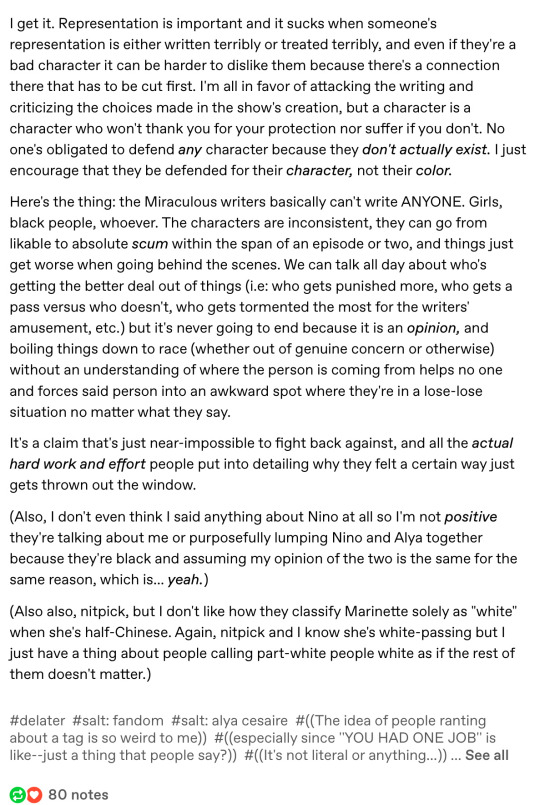
So this is the reason why I’ve been getting these racist anons for the past few days?
Cuz this person decided that my posts, and really all these Black content creators I’ve shared, had no “actual hard work and effort” put into expanding on racist tropes in media? Because all we do is “make everything about race”? The hell?
How exactly are you any different than those you accuse of belittling your analysis of these characters? Because you don’t exactly sound any different from the anons I’ve been getting.
No there isn’t some dumb conspiracy of PoC out to shame White people of their racism for everything in order to silence you. Truth be told we let y’all get away with A LOT of casual racism, because the immediate backlash we face in response is exhausting enough
Funny thing is, I don't know you. You even mentioned that I was probably not referring to you, so why are you upset with my post? I don't know what tags you are talking about. I'm talking about how I scrolled through the ML tags only to see how Alya AND Nino had "one job" of always believing their friends and going along with their plans no question. That's not a friendship. Again don't know why you picked beef with me even though all I did was talk about a racist writing trope fans still don't know about
Only reason I even know who you are now is because the first anon hate I got mentioned you. Didn't think much of it cuz it's anon hate and I deleted it. But the one I got today went too far. So I tried DMing you to at least see if you know something about this. Found out you blocked me the day you made this post of yours
I still don't know if these are even your followers or someone who had beef with me but used you as a mask. Regardless, there was no reason for you to blast my post like that, and frame it as though I'm silencing people by making them feel uncomfortable. And no, I'm not upset because you have a so called different opinion. I'm mad that you put me on blast on a public post, contradict yourself of how you shouldn't shame people of their opinions, and then have the nerve to block me
As tempted as I am to @ you I don’t see the point, and I really don’t care. I just want people to see how much of a victim complex y’all have when confronted with these topics. And instead of just CONSIDERING the possibility that others can provide different viewpoints on these subjects, you double down like this.
Anyways here's a quick lesson in how you can be critical of Black characters without being racist. It was prompted by an anon who at this point was probably trying to act smart
#miraculous ladybug#fandom racism#and don’t get on my case about how I could have just had a private conversation because they apparently blocked me a while ago#alya cesaire#alya salt#nino lahiffe#Nino salt#today was just not the day#miraculous ladybug salt#rant
24 notes
·
View notes
Text
What is an Alpha Reader?
Stories don’t exist without writers - that much is a given. But the best stories are never a solo effort, even if they have only a single author. Other people will contribute, in big ways and small, and potentially fill many roles to help the author see the work through to completion. Three of the most prominent of these roles are:
Alpha readers
Editors
Beta readers
Each does something different, but often in fandom-based writing spaces they’re used interchangeably in ways that can lead to confusion and a mismatch of expectation and performance between the author and the person helping them. As such, Duck Prints Press will be doing a series of three posts over the next few weeks that discusses each of these roles in detail. The purpose of these posts is
to provide a definition of each role (alpha, editor, and beta)
list examples of services a person in each role might provide for an author,
provide insight into some appropriate ways for an author to interact with their helper, and
to suggest some points that an author and their selected feedback provider should discuss before the alpha/editor/beta begins work, to ensure that both individuals have a positive experience and that the helper is providing the kind of information that the author is seeking.
Two things of note before we proceed:
There is no single definition of these terms. We’re not claiming to be an authority or to say, “these are the correct definitions and all others are invalid.” Instead, our goal with these posts is to provide a common framework to help authors and individuals interested in helping them communicate about the nature of the roles to be undertaken, and to give information to help both writers and people who want to help writers understand what help is desired and how they can support each other.
If an author hasn’t said “I’m looking for an alpha/editor/beta,” then it doesn’t matter what form of feedback you provide - unsolicited alphaing, editing or betaing is generally unwelcome and often unhelpful. Yes, some authors DO like and appreciate it. However, most don’t. Never use these posts as, “now that I know what alphaing is, I’ve read your story and now I’m alphaing for you!” That’s not how this works. Alphaing, betaing, and editing are always collaborative, undertaken between an author and feedback provider that they’ve entrusted to help them. If you’d like to give feedback to an author about something of theirs you’ve read...ask them if they want it! And respect their response! It’s really, truly that simple.
What is an Alpha Reader?
Alpha readers are generally one of the first “outsiders” brought in to support an author, and, depending on how the author approaches their process, may be sought before the story has been written. The primary roles of an alpha reader are to brainstorm with an author, flesh out the plot, fill plot holes, solve conundrums and issues that arise, and help the author get their vision of the story put down in concrete words. Alpha readers may be recruited short term, to help an author work through a specific issue, or they may accompany the author from conceptual inception through the entire first draft or beyond - some may even end up credited as co-authors, depending on how many ideas they end up contributing! In fandom spaces especially, alphas are often described as cheerleaders, and in many cases, they are explicitly asked not to provide extensive criticism and editing - alphas work with the understanding that they have been brought in to help an author complete a first draft, and so the issues they help with are those more relevant to a work at an early stage of development.
Many people short-hand alphas by jokingly refer to them as “rubber duck debuggers,” inspired by the habit many computer programmers have of talking out a problem to an inanimate object until they figure out the solution. The idea is that alpha readers often don’t have to do anything - they just have to listen to the author until the author figures out the solution themselves! Sometimes, that’s truly all that an alpha will need to do, but don’t assume that’s all an alpha will do, and don’t play down the critical role that many alphas have played in the development of stories by giving timely, insightful feedback. An alpha can be invaluable in solving issues, seeing through thorny challenges, resolving points of uncertainty and confusion, and providing the author with the motivation, support and encouragement they need to see a first draft through to the end. Alphas are great, and are definitely not interchangeable with a rubber duck (however much we at Duck Prints Press love our rubber ducks).
Services/Responsibilities/Activities Associated with Alpha Reading:
Meet with the author to establish the scope of help the author would like. This post includes a thorough list of tasks often undertaken by an alpha reader, but it’s unlikely that an alpha reader will do all of these tasks.
Listen to and incorporate world building and character information provided by the author, and work to provide feedback that fits with what they’ve established.
Read an author’s notes or outlines to get a general idea of what the author is trying to accomplish
Discuss story elements with the author to whatever degree of detail and specificity the author requests.
Offer insight and ideas to help solve problems that the author approaches you about, within the scope of what the author has said they’re willing to change or modify about their story.
Cheerlead, praise, and support the author as they write their first draft.
Indicate sentences, passages, and/or chapters that work especially well, and those that lacked adequate explication for the alpha to understand what took place.
Point out issues with representation, areas where the author might need to do more research, use of racist or sexist tropes, and other aspects of the story that may be problematic. (Please remember to be careful of the difference between “this story contains problematic elements” and “this author is problematic.” Many authors intentionally playing with these elements. Also remember that alphas are not the same as sensitivity readers!)
Make sure to offer feedback on what is good and what you like!!
If given a full first draft manuscript to review, post-reading you may be given a list of questions the author would like you to answer, indicating specific areas that the author would like more information about and/or help with.
Very rarely, an author may ask for an alpha to edit for grammar, structure, word choice, and other technical elements. However, in “standard” definitions of alpha reading, these roles would be excluded.
Be honest and objective! Don’t say something is good if you don’t think it is, and don’t say something is bad just because you didn’t like it.
Understand that an author is never obligated to take an alpha’s advice!
Services/Responsibilities/Activities Associated with being an Author Working with an Alpha Reader:
Have a clear idea of what an alpha reader will be asked to do before recruiting one - ideally, any request for an alpha should include this information! Don’t just say, “I’m looking for an alpha reader” and assume that anyone who responds will understand that to mean the same thing as you do. Instead, say, “I’m looking for an alpha reader to help me with…” and indicate the specific area(s) that you’re requesting support for.
Don’t ask for feedback if you’re not prepared to be given feedback. Understand that requesting an alpha may mean opening yourself up to criticism; never forget that you invited them, so respect them and appreciate them. Don’t ask someone to alpha for you if you don’t respect their opinions and assessments.
Communicate your expectations and needs clearly.
Listen to the alpha reader and take their advice under consideration.
Indicate when you’ve reached a decision, so the alpha reader doesn’t continue to focus on a point that has been resolved.
Be kind and polite, even if ultimately you reject the alpha’s recommendations.
Ask clear questions directly related to what you’re trying to find out about what works and doesn’t work in your manuscript. Don’t try to be vague or passive to try to “get at” if something worked; it’s better to be honest and straightforward.
Employ multiple alphas to get different viewpoints.
Do not take criticism of the work as criticism of you as an author and person.
Respect the alpha reader’s boundaries.
Understand that the alpha is never required to agree with you, and may ultimately dislike your work.
Communication is critical! If both parties aren’t clear about their expectations and responsibilities, how can they effectively work together? It’s also critical to set and maintain boundaries. An alpha doesn’t agree to be “on call” 24/7. An author doesn’t agree to hear endless criticism of their ideas. An alpha should never be subjected to material that they’ve indicated may trigger them. An author should never be subjected to an alpha harping on a pet idea that the author has already indicated they don’t wish to use. If the relationship isn’t working for both individuals, it should be terminated. Furthermore, just because the relationship doesn’t work, that doesn’t mean either individual is “bad” at fulfilling their role; often, it’s simply a mismatch in communication and work styles. And that’s okay! Don’t bad mouth someone you failed to work effectively with...but also, don’t feel you need to keep working with them!
Suggested Questions an Alpha Reader and Author Should Discuss Before Working Together:
Not all of these will be relevant to every author/alpha relationship, but they’re worth being aware of!
Will the alpha reader be paid for their help? This is generally not relevant in fan spaces, but may be if the alpha is working on an original work destined for publication.
Will the alpha reader be credited when the final product is made public?
Will the alpha reader be expected to keep silent about what they’ve read, or perhaps even sign a Non-Disclosure agreement or other form of contract?
When is the alpha usually available? When is the author usually available? Will meetings be held regularly on a schedule, as-needed, or elsewise?
What software and/or accounts will the alpha be expected to use? For example: a specific word program, a gmail account, Discord, etc.
How will the author and alpha communicate primarily? For example, by chat program, by e-mail, by telephone, etc.
Is the alpha required to be familiar with other works in the author’s oeuvre?
Is there any potentially triggering material in the work that the alpha should be made aware of?
Does the alpha have any unusual triggers or squicks that the author should be aware of?
At what stage of the project is the alpha reader being invited in - conceptualization? Writing? Completed first draft?
What specific aspect(s) of the book is the author looking for feedback on? The plot? The characters? The pacing? If a specific line landed as intended? Is the dialog catchy? Is the world-building thorough?
Will the alpha reader be providing long-term help (eg, for the entire time an author is writing the first draft of a novel) or short-term help (eg, an author has gotten stuck at a specific point and wants to discuss only that with someone else)?
Is the author looking for someone to primarily listen to them and let them work it out on their own?
What are the main themes/tropes/elements/etc. the author hopes to communicate? It’s often best to discuss this after the alpha has read the work, so the author can see if they’ve succeeded, but it depends on when in the process the alpha has been brought on. If the alpha is helping develop plot and concept, it will be important for the alpha to understand upfront what the author is trying to accomplish.
Is the alpha familiar with areas relevant to what the author is writing? For example, if the story is fanfiction, is the alpha familiar with the franchise? If the story is in a specific genre, is the alpha acquainted with the tropes of that genre? If the story is in a specific setting - especially if it’s a setting with a high degree of technical specificity - is the alpha able to offer insight and knowledge to support accurately portraying that setting?
Does the author want criticism at this stage? (Usually, inviting an alpha implies the answer to this is yes, but don’t assume!)
Does the author want editing done? (Usually, inviting an alpha implies the answer to this is no, but don’t assume!)
Are there aspects of the story the author feels are “set in stone?” Are there aspects the author doesn’t mind changing, or would even prefer to change?
Is the alpha welcome to provide suggestions for developments outside the framework of storyline and world building provided by the author? For example, would the author be open to having the alpha say, “maybe you should create a new character to fill this role,” or, “maybe you should change the entire ending,” or would they prefer that the alpha work with the plot, characters, pacing, etc., elements that the author has already created?
Check in throughout the process - Is the way I’m doing this working for you? Is this feedback helpful? Are my responses as the author enabling you to do your work as an alpha? Do we need to change anything to ensure that this is providing the kinds of support that the author has requested? Talk to each other! You’re in this together. It’s okay if things need to be changed (in the story, in the relationship, in the communication style, you name it) - change them until you find a way to collaborate that works best for both parties.
You’ll see the common theme in all this advice is that the key to a successful alpha/author relationship is communication. Authors: be clear and honest about your project and your needs. Alphas: be clear and honest about your assessments and suggestions. Work together, not in opposition. Now, go forth and write things, and read things, and make amazing stories!
We’ll be doing two more entries in this series - What is an Editor? and What is a Beta? in the coming weeks, so stay tuned!
136 notes
·
View notes
Text
the main thing that bugs me about ao3 discourse is i just. i never see anyone lay out what they actually Want from ao3 besides 'delete everything i think is bad' like theres no. sense of practicality? what exactly do you want added to the tos. what is the exact expected process for reporting fics and evaluating those reports. disclaimer before anyones like 'Oh so youre unilaterally defending them' i do extremely think they should at the least not allow rpf of irl minors. but when it comes to enforcing policies that aren't related to like, laws, i just wonder how you expect it to work... should they just delete anything/anyone who gets reported a lot, like plenty of sites do? then people are gonna exploit that system and get people mass reported over petty shit, just like on twitter. should there be a moderation team instead? who picks that team? who's on that team? what if the team makes decisions you don't like?
especially when you're talking about creating some kind of policy for 'eliminating racist content,' like-- what counts? i'm guessing that like, troll works that are just a wall of slurs already get deleted (if they don't then they should be because that's pretty simple) but like. who decides what's 'bad enough' to merit outright deletion? if it's done by volume of reports, wouldn't that essentially be arbitrary moderation because it depends on a random group of people who potentially all have different problems with a fic and those problems can vary wildly in severity? like, what about when it comes down to nuances of how a character is treated? dramas like we had with finnpoe discourse, where either character topping might invoke different racist tropes, so how does one walk the line and how do you cope with how not everyone who attempts to walk it will be successful?
i saw one post giving the example of a fic that just like, rewrote the events of last year's protests to be set in the transformers universe, and yeah that's tasteless, there's been offensive 'current events' fic happening for a long time and it sucks. but should there be an explicit ban on that genre? how would that clause be worded? does Everyone agree that it's something that's impossible to do tastefully? if a black person does want to work through their feelings on current events through fanfiction, is that still banned because it's presumably impossible to do well, or should it be allowed because they have the right perspective? do they have to meet a certain standard of 'doing it right', and who evaluates that? and how are ao3 moderators supposed to know or believe they have that perspective? (we've already seen people racefaking to get 'permission' to write tacky racist fic just due to social pressures. imagine the lengths people will go to if their work or account is on the line.)
like-- sorry if this is a gauche comparison but since it's something i'm familiar with and able to speak on. what if the next wave of criticism is 'ao3 needs to crack down on transphobic content'? how will you define that, beyond 'delete fake fics that are just slurs'? would entire tags like omegaverse, or 'boypussy' and 'girl!penis', or even 'genderbend' get deleted? what about trans authors using those tags? do we become the only ones allowed because we can do it 'correctly'? how do we deal with the fact that not all trans people agree on what's 'correct'. like i don't think genderbending is inherently transphobic, it's down to individual choices and portrayals. same with omegaverse, same even with 'boypussy/girl!penis', since like. people might take issue with the entire premise of 'characters have this type of body and it just doesn't like, mean anything' as being fetishizing of trans bodies/erasure of trans experience and i sympathize with that. i'm not certain where i fall on the matter either, it's very much a case by case thing.
so then, how do you moderate that? do we get rid of those tags because someone decided nobody can use them responsibly or should like the premise at all? again, do we appoint moderators to decide when an idea is handled 'correctly' and again, who are the moderators? what happens when they make a decision you don't like? how do you distinguish between fic with a 'wrong' premise and fic with an 'okay' premise that is executed imperfectly and leads to interpretations or implications that upset people, especially when many fic writers are young and amateurs? should someone who made mistakes be punished with deletion just as much as someone who, like, intentionally wrote character-bashing/abuse fic for racist/transphobic/etc reasons?
like, none of what i'm asking here is supposed to be applied to general discussion of these subjects, it's not like i think offensive content should never be taken down, i'm not pulling some kind of 'everything Could be offensive so actually nothing is' or 'if they didn't mean to then it doesn't count' or anything like that. but we aren't talking about interpersonal discussions, or the handling of mass media, or anything like that. we're specifically talking about the concept of 'just delete everything that's offensive and exploitative' and how that would potentially be implemented. because ao3 is not a person who said something tasteless on twitch and can be reasoned with and led to make an apology. ao3 is a website hosting all sorts of ideas from millions of users, specifically in the form of fiction, and the way fiction conveys biases and shapes people's thinking is itself a really fucking complicated subject, and people are trying to demand that they try to tame that massive volume of content from different people in very specific ways, with no suggestion of how to actually go about doing that.
i know you think 'delete the stuff thats obviously bad' is a simple principle but it's literally not because no two people will ever 100% agree on what's 'obviously bad', particularly in this case because people don't consistently agree on whether depiction always equals endorsement AND it's so difficult to reliably tell whether depiction that seems to be endorsed was intended to be endorsed. so again, the primary, most practical options for 'delete things that are bad' are to either delete everything that anyone reports for any reason or to have moderators that make flawed human choices. i just want to feel like any of the people making 'ao3 bad' posts have actually like, considered that, and have some sort of opinion on which one it should be, if theyre gonna fight about this.
and, yknow, if they did have to hire a massive team of additional moderators to actually read every fic and take the time to make subjective decisions about whether it's offensive... they would need to pay those people... and they would still need donations. so lmao.
im not saying like 'youre not allowed to want things to change' like there's definitely room for improvement but. please god. start explaining what you want those changes to be because 'delete everything i personally think is bad' is not a moral imperative or a coherent category or a helpful suggestion in the least, if you think with your brain and not your gut instinct of disgust.
#and i genuinely dont even have the energy to get into the donations thing more like#yeah literally there are more important things to send money to than a fanfiction site. but#the like mindset people are advocating for. of constantly being aware and like living in penance for the fact that there's always people wh#and always bad things happening and all of this is Your Fault through inaction or 'wrong' actions that prioritize yourself#is just. its not healthy bro. it really sucks
61 notes
·
View notes
Note
1/2 I agree that leaving bad reviews in bookmarks is discouraging but also, authors should be fully responsible for tagging their works properly. Just this week I've read a fic that at the drop of a hat added another person into my OTP without any warning whatsoever which was really shocking to me who followed their whole story. Also there are so many Wangxian fics out there that aren't tagged properly for either past rships or hookups which is a hard pass and OOC bs to avoid for some of us.
2/2 And don't like don't read would be easy to do if I could only avoid such fics but oftentimes there is no way to do so because of improper tagging. Then I also appreciate some warning in the bookmarks if the author didn't bothered to do it themselves.
I think there's a fundamental flaw in this viewpoint, and that is the assumption that everyone has the same information that you do. I know I just said that fandom is a small town, but also, new people come in every day.
We exist in a Tumblr-bubble here, and marinate daily in posts about tagging on AO3. It's impossible to avoid one opinion or another on that topic. I assume Twitter is the same way.
But here's something that I've learned from doing this blog and trying to tag the author of each work I rec: there are many, MANY authors who simply aren't on Tumblr or Twitter. They are people who just... read fanfic and have written fanfic and post it. So assuming that they have read all the same meta posts that you have is often baseless. And even if they ARE on these platforms, it still doesn't mean they've heard all the same lectures.
I didn't know jack about tagging when I first started to write. Being aware of tags was actually something I absorbed more from being a reader than a writer, actually, and I treated them like toppings on a drive-through marquis.
So if you read a fic that needs tags, approach the author about it as if they didn't know. Say: I have some tagging suggestions, would you like to hear them? And, if they say yes, you can continue: "Oh, whoa, I was so startled to see that you have my OTP fucking Other Person, that's such a squick for me: you might want to tag #OTP/Others so other readers don't end up floundering like I did."
And then the author can make an informed choice.
Here's the kicker: they can still choose not to tag it. Maybe they want it to be a surprise, or be shocking, or whatever, I don't know. But an author is not REQUIRED to tag anything except for the big 4 (underage, rape/non-con, graphic violence, major character death... OR 'author chooses not to use archive warnings'). I've never encountered an author who didn't add a tag when asked, but it is within their rights to do so.
And there is certainly nothing wrong with tagging your bookmarks with pairings [like OTP/others], kinks, tropes, whatever... these things are NEUTRAL. Now tagging a bookmark with #bad writing, #OOC, #racist, #sexist, for example, is not neutral and is also an opinion that others may or may not share -- so don't do it publicly.
***
Does this help? Again, I approach this from the perspective that authors are giving you a gift rather than you, the reader, being the most important person in the relationship. You are not OWED tags unless it's the big 4. HOWEVER, most writers are happily flexible about it. Just ask, first. It might be that they never thought about it, or didn't realize they could tag, or who even knows.
And don't be shy about tagging your bookmarks (just stay away from negative opinions)... I think it's so helpful, and I often search via bookmark tags if I've exhausted works with the tag I'm looking for. (Like #huddling for warmth, or #involuntary invisibility.)
***
In short: you can make your bookmarks very helpful to other readers WITHOUT being critical or negative. So just exercise some creativity about it. And don't be afraid to ask the author if they're open to suggestions. Most of them are. And if they aren't, then just move on. There are a million fics out there. Don't get hung up on this one.
42 notes
·
View notes
Text
RWBY Recaps: Volume 8 “Midnight”
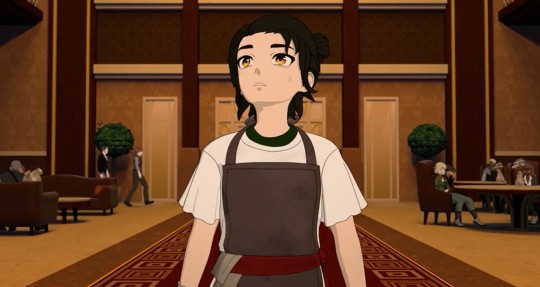
Happy Saturday, everyone! I’d like to extend a formal congratulations to every Cinder fan in the community. Criticisms of the writing aside, you all struck gold with twelve whole minutes devoted to your fave and I’m absolutely thrilled for you.
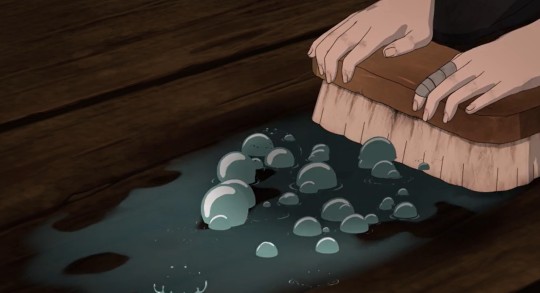
We again start with a dark screen and some audio, in this case Cinder’s scrubbing. This technique—along with closeups on eyes—is a real favorite of RWBY’s this volume, to the point where I think they’re a little too enamored with it. But at least this is just a preference, not something that actively harms the storytelling in any way, so it’s welcome to stay. This time, unlike our premiere, we stay on Cinder as her life is summed up with three events intercut with one another: scrubbing floors, getting taunted by boys, and the sound of heels making their way towards her. It’s clear that Cinder leads a poor, miserable life, if her dirty clothes and stronger guys throwing her around is any indication, but all that changes when the rich woman says “I’ll take her” and Cinder is transported to a better life in a wealthy hotel.
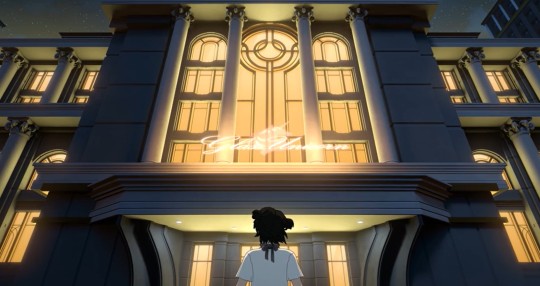
At least supposedly.
Here’s my problem with the worldbuilding. This moment has Witcher vibes and Witcher, in turn, built itself off of a trope seen a hundred times before: A young woman is treated terribly by her family, is whisked away by a wealthy/powerful caretaker, and though her life has arguably improved, she quickly learns that the new world she’s entered is just as dangerous and harsh as the one she left. In Witcher’s case, Yennefer is a disabled woman abused by her family, bought by Tissaia, and taken to Aretuza where the other girls hate her and the curriculum is potentially deadly. Cinder is a poor woman arguably abused by her family (scrubbing)/the locals (fights), is taken by an unnamed woman, and whisked away to the swanky hotel where the daughters hate her and the work is potentially deadly due to shock collars. The difference between these two setups is that Tissaia bought Yennefer because of her magical potential. Why does our hotel lady take Cinder?
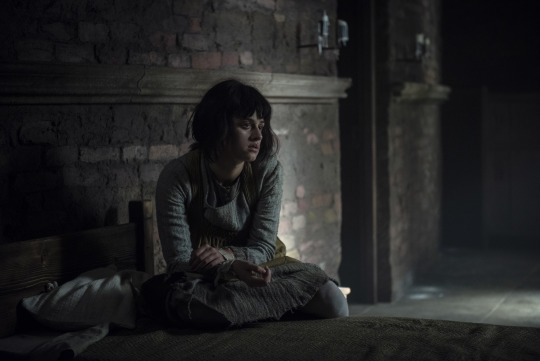
I mean yeah, obviously she wants a slave, but it’s a little weird isn’t it? Usually when a young woman falls headfirst into a new and questionable life, there’s a solid reason for her entry. This woman—whose lack of a name also says something about the worldbuilding—could have hired anyone she pleased to abuse. As we saw in regards to Atlas and Mantle in the past, every city has its poor and downtrodden. So what made her go out to some random farm and snatch Cinder up? It just, as always, feels a little too convenient. Cinder didn’t enter this life because something about her characterization or origin justified it, the plot simply ensured that she, out of everyone possible, and with very little reason, was the one chosen to follow The Plot™ .
It also messes with the Cinderella parallels. Originally (or “originally,” going off of Disney here which is likely what RWBY is using as a template too) it’s her step-family that abuses her and yes, we recreate that via the hiring (“hiring”—I doubt she was paid), but Cinder was already scrubbing floors back home. Her status as the servant already existed. So why change locations? Why not just keep Cinder as an abused farm girl, or have her a part of the hotel family right from the start? Part of the reason why Cinderella resonates is because of the contrast between the happy life with her father and the new, horrific life she falls into once he dies. Which is then further contrasted by the rest of the outside world. Fairy Godmother, Prince, and party-goers alike are all presented as kind, decent people. They represent the “real” world that Cinderella can escape to. By making Cinder’s original life horrible, her new life worse, and everyone connected with that life cruel and/or indifferent (with the exception of this one, special huntsmen)… you paint a very different picture of the world as a whole. Which is something RWBY has been vocal about trying to accomplish—it’s not a fairy tale—the only problem is with how these moments are undermined the second the story wants Ruby to ~Believe in People~. Cinderella is a story about enduring and eventually overcoming temporary hardship. Cinder’s story is about endless hardship that creates villains. A dark and fascinating story… but how does that fit into last week’s episode where Ruby told the whole world about Salem, expecting them to band together in peace and harmony? This is how Remnant’s world treats people when there’s not a global crisis, and Cinder isn’t even a faunus.
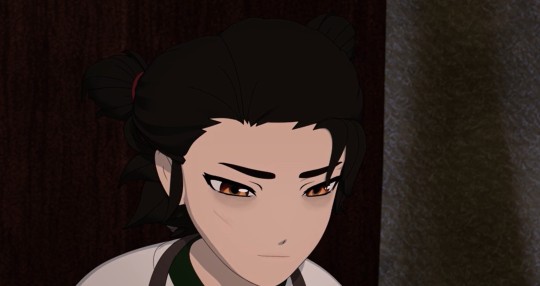
Which, I want to make clear going into the rest of this recap, does not excuse Cinder for her actions. At all. I think there are some complicated acknowledgements to be made in terms of her abuse and the Huntsmen’s responsibility in it continuing, but that does not give Cinder a blanket pass for all the horrific shit she has pulled over the years. Cinder didn’t just defend herself from abusers, she became one. More on that in a minute.
First though… is the Huntsmen’s name Rhodes? Did we hear that in the episode? If we did, I totally missed it because I have a note here about the one important character not getting a name. So yeah, idk. If we got this from more supplemental info, bad RWBY. If I missed it, bad Clyde. Either way, I’ll use that name going forward.
Back to the plot at hand. The hotel is, as said, populated by indifferent and shallow people and there’s no desert nearby, so I presume we’re supposed to be in Atlas? (Why did this woman buy a girl from another Kingdom?) There are customers getting drunk, flirting, and generally just enjoying their wealth, which harkens back to Weiss’ comment in Volume 4 about all their problems being superficial. We’re introduced to the owner’s two daughters who are, as expected, quintessential Mean Girls.
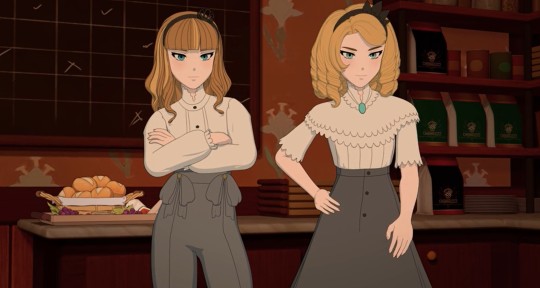
They love ordering Cinder around, not just with hotel chores, but personal ones as well like, “rub my feet”… despite the fact that this place is massive and must have an equally massive staff to stay in business. Why aren’t the girls terrorizing anyone else? Again, it makes sense for Cinder(ella) to be the focus of their abuse when she’s in a single household, but transplanting that to a hotel raises a lot of questions that RWBY hasn’t bothered to examine. You can’t move a story like that and not think about what further changes that would evoke.
See, RWBY could have done something interesting here by considering some of those other changes. Like having one or both step-sisters be the one to help free Cinder from her abuse, playing the villain before becoming the fairy godmother. Up until she turns villain instead of hero, this is just Cinderella’s story copy and pasted into RWBY. It’s moments like this that should make us wary of using fairy tale allusions as evidence for our readings and theories. Whether RWBY is deconstructing or upholding a story varies wildly, and we never know what we’ll get until we actually see it on screen. Even then we can’t count on a choice remaining consistent, as we saw with Ironwood’s deconstruction being tossed out the window in Volume 7.
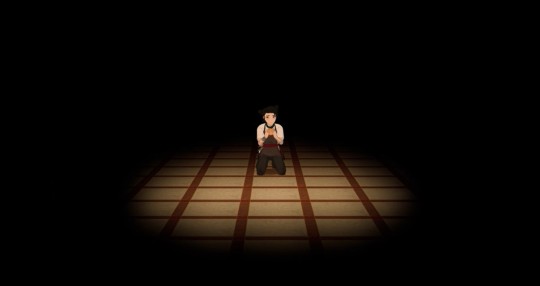
Cinder is originally just as meek as her fairy tale counterpart too. We don’t hear her speak until the owner is about to leave when she simply goes, “Food?” The sisters laugh at her and a roll is thrown to the floor with the comment that she should get busy because it “looks filthy.” I quite like that moment. Your job is to ensure the floors are clean enough to eat off of—literally.
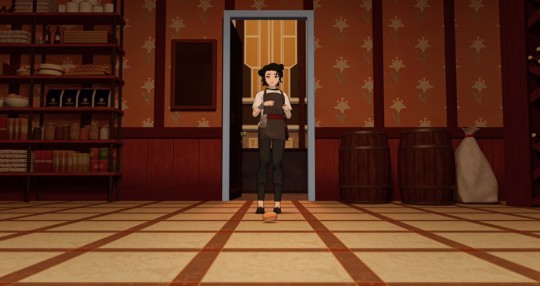
We see a montage of Cinder doing just that, lots of chores, with a new song listing all the tasks she’s now responsible for. During this, Rhodes is seen in the background and witnesses when Cinder (presumably) first uses her semblance by heating up the brush and chucking it at the sisters, creating a massive cloud of steam.
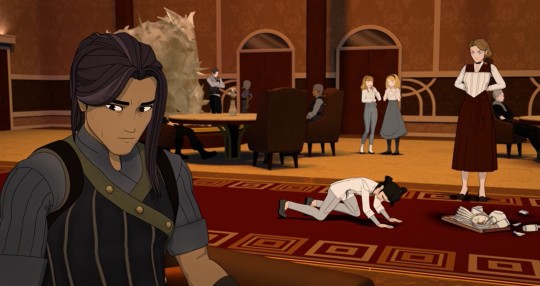
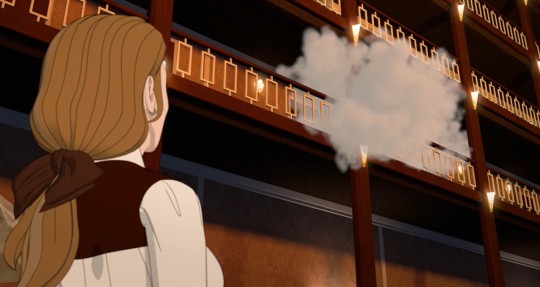
It’s that moment which “earns” her a shock session with her necklace and I’m staring at the screen, a little open-mouthed. I mean, that’s the second child torture we’ve seen this volume (with Cinder being ten here). Again, I’m not making a specific accusation, just going, “Really?”
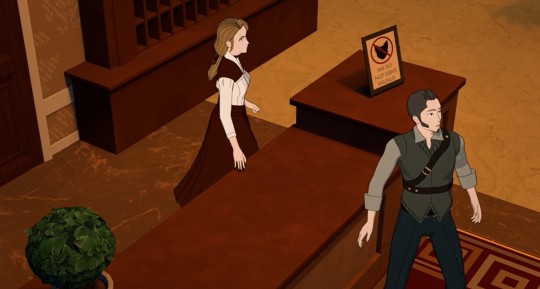
Also, note the anti-faunus sign. Nothing like continually showing us racist establishments rather than actually writing a story that deals with the racism needless put into the story world. I’d like to remind everyone of my previous comments this Volume about how the story works hard to paint Mantle as sympathetic, but refuses to show anything that does the same for Atlas citizens, people who are in just as much danger with Salem as an equalizer. A whole city is not actually made up of shallow racists, the show is just showing us only those people to create a simplistic “They’re all bad” reading that encourages us to reject Atlas and, by extension, Ironwood. Weiss is walking proof that Atlas citizens are both complex individuals and capable of bettering themselves. If we can come to adore the Schnee heiress, we should be questioning why nearly every other citizen is painted as an abuser, too wealthy to care, or has conveniently left the story (Rhodes dead, Klein gone, Whitley rejected, etc.).
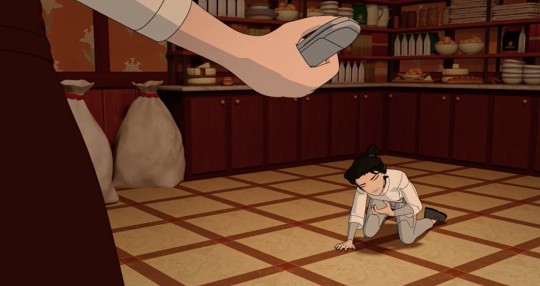
As Cinder is being tortured, we see that she’s forced to say, “Without you, I am nothing.” Now see, this is excellent... in theory. This is the kind of line we needed to hear with some consistency over the last seven years (if RWBY still insisted on waiting that long for a backstory), setting up that this line is clearly engrained in Cinder and she repeats it on instinct. Instead—to my recollection, anyway—we only get it this Volume, in two episodes. If it appeared before then it wasn’t notable enough to remember. I commented on this before, but it wasn’t a, “Ah, this line must be important” reaction, it was a “Lol why is RWBY using the same line twice? That’s weird.” By only giving it to us twice before the backstory and in such a short timeframe, the impact of this reveal is lost. We’re only now realizing that the line is important, rather than coming to realize why.
Our writers know just enough to recognize what techniques work, but not enough to have figured out what makes them tick. They get that providing a RWBY-vised version of Cinderella is cool, but not how to adapt that 100% successfully. They know that repeated lines have power, but not how to create good setup for the reveal. They know the camera should use closeups, but not what moments are important enough to warrant that. RWBY, eight years on, still feels like a newbie writer copying what the great stories are doing without yet understanding why those aspects work and, thus, how to recreate them.
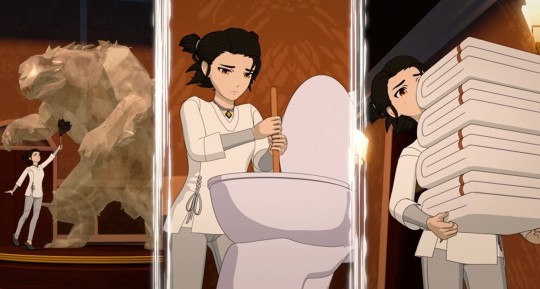
I mean, Cinder’s backstory appearing now attests to that most obviously. I waved at the Cinder fans before, but the reality is that most viewers don’t care, either because Cinder herself is so bland, and/or because the story waited too long to make her a little more interesting. This entire flashback was handled badly simply by virtue of it arriving over seven years past the character’s introduction.
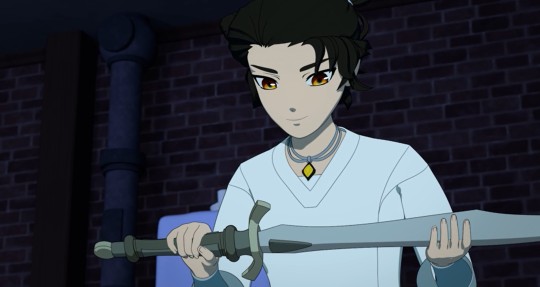
So after this torture session Cinder steals Rhode’s sword. We hear some dialogue in the background of him getting pissed that it’s missing and the sisters promising to find it, implying that Cinder will have this tool at her disposal for a while. Instead, seconds later he’s found her hideout and confronts her. I don’t know if I’m impressed with Rhode’s skills, or rolling my eyes at how contrived this all is. Chuck in the question of whether Cinder was talented enough to steal the sword out from under him, or if Rhodes was stupid enough to leave it lying around, and I’m edging towards the eye rolling.
He dodges Cinder’s attack, rolls her more weapons to prove he’s not here to hurt her, and acknowledges that she’s not getting “the most fair treatment.” Okay, here’s where things start to get complicated. Rhodes tells Cinder she shouldn’t run away because then she’ll be running her whole life (don’t really agree with that). He likewise (rightly imo) tells her not to straight up murder them because look, no matter how much of a shit stain someone is, I can’t condone slamming a sword through their chest on an individual’s say-so (especially when two of those people are also kids growing up under an abuser, like Whitely). So what’s left? Rhodes says Cinder can train to become a huntress. At ten years old, she has seven years to prepare for the exam.
But she has to stay with her abusive family until then.
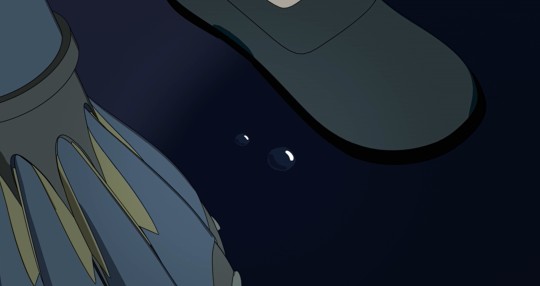
My problem is far less with the claim that this “has” to happen and far more with the writing’s failure to tell us why. Cinder could have begged to come with Rhodes and he says she can’t because… idk. Make up a reason. He doesn’t make enough to feed the both of them. It would be too dangerous out on missions without training and he doesn’t have a permanent place to stay (hence using the hotel all the time). He could even go the “They’re your legal guardians” route with more explanation because it’s arguable that Rhodes had no idea about the collar. Doesn’t mean Cinder’s treatment isn’t “that bad” in his eyes, just that he might not have known the extent and thus thought it was preferable for Cinder to put up with “just” being insulted and overworked until she’s 17. That this life that he only has a partial picture of is preferable to the life she’d have at his side. Something to explain the stakes here, the risks, and why he took this stance.
And/or give us a reason why Cinder doesn’t try to run, a suggestion I make very cautiously because it’s not my intention to put the responsibility solely on her. This isn’t meant to be a “Just save yourself! It’s easy!” claim. Rather, it’s an acknowledgement that young, barely trained kids go out into the world all the time in this show—Ruby, Oscar—and it’s an acknowledgement that Cinder tugged off her collar easy-peasy. The point is, practically speaking, Cinder could have left and braved the streets like Emerald did… so give us a reason why she decided to stay. Maybe she’s scared of living on the streets, acknowledging that a little food and a place to sleep is better than nothing. Maybe she’s scared that if she doesn’t have a direct connection to the hotel (convenience), Rhodes won’t train her anymore. Maybe, as an abuse victim, she can’t articulate why she won’t leave, she just can’t. Something to acknowledge these gaps because, right now, we just have the fandom going, “See? This is why the huntsmen are all evil cops. Rhodes took the lawful route and look where it got Cinder! He’s the responsible adult in this situation, so it’s all his fault.” Problem is, this take ignores:
The fact that our heroes are also huntsmen and were pretending to be huntsmen before they had those lawful licenses. So what does that make them? We can’t continually criticize these professional roles without criticizing our heroes’ use of them as well. Ruby just ensured the world would take her message seriously by introducing herself as a huntress. We can’t condemn these laws and privileges while likewise letting Ruby continue to use them however she please. It’s okay if she’s a part of the system, because Ruby is inherently good! That’s not how this works. I’ve just described every American cop show that tumblr is currently turning against: The system is corrupt and needs to be overhauled, but our protagonists are different.
The story fails to tell us why Rhodes won’t do more outside of a single line about Cinder being of legal age. That just acknowledges that age has some bearing on his decision, not whether it outweighs other considerations (can Cinder survive if she leaves?), or whether Rhodes even has a full picture of what’s happening to her (the collar). The takeaway is that we don’t know what his though process was because RWBY didn’t show it to us, not that his thought process is automatically awful.
Rhodes, as a literal stranger entering her life, is not 100% responsible for what happens to Cinder. I know people don’t want to acknowledge that because leaving a child in that situation is absolutely horrific, but if RWBY wants to be ~realistic~ (and it does) then we need to acknowledge that reality too. If you saw a child employee getting yelled at in a hotel and then found her with your sword, would you rip the collar off her neck and be like, “Congratulations, you’re my child now”? Nice as that trope is, probably not! Or hell, maybe a lot of you would upend your life and risk legal action to whisk them away, but a lot of other people wouldn’t... and they're not the devil for doing what they can within the bounds of the law. The idea that because Rhodes unexpectedly had one (1) encounter with Cinder means he’s now responsible for her life and outcome is, well, crazy. “But, Clyde, you can’t just see that kind of horror and not do something about it.” You’re right. You know what you do? Tell the authorities. But does Remnant have the equivalent of social workers? We don’t know! Which means we can’t assume that Rhodes didn’t call them just because he’s a bad person. Or maybe they exist and the fandom considers them too corrupt to be useful, like so many other authorities in this show. So… what else is there for him to do? There doesn’t seem to be anyone above Rhodes that he can turn to, he doesn’t (for whatever reason) want to essentially kidnap Cinder and start a new life with her, so what’s left? Try to give Cinder a healthy relationship and a way to escape in the long run, which is precisely what Rhodes did.
Honestly, I’m kind of salty that this guy went out of his way to help her, he saw what everyone else saw and was the only one who would help her, but because he didn’t do more—because he didn’t entirely upend his life and/or risk arrest to take her away to this hypothetically better situation—the fandom is acting like it’s his fault Cinder killed her abusers. It’s not. Cinder made that choice.
At the end of the day, blaming Rhodes reveals the expectation that it’s his responsibility to solve this massive problem purely because he had the bad luck to be the one Cinder stole from. That’s like telling a teacher who learns about abuse from a paper that following the lawful channels and going out of his way to assist the child in other ways is responsible when the kid murders their family one day. “Why didn’t you just barge into the house and take the kid?!” Because there are a hundred reasons why that would go incredibly badly? Rhodes can’t help Cinder if he’s in jail. Rhodes can’t help Cinder if she ends up dead on a mission while following him. Rhodes can’t help Cinder if their attempt at escape fails and she bears the punishment.
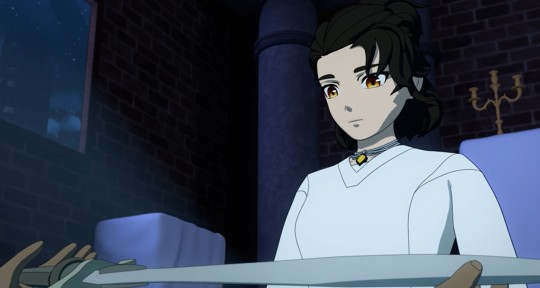
The only thing I think Rhodes did absolutely wrong was giving Cinder the sword while she was still under the owner’s thumb. Stupid, but not cruel. And again, stupid does not equal blanket responsibility. I’m likewise seeing, “Rhodes gave her the sword and thus it’s his fault that Cinder got in trouble. It’s his fault they died. What was Cinder supposed to do, not defend herself?” Are people forgetting that Cinder stole the sword herself in the beginning and then readily accepted it again? She had agency in obtaining weaponry and what she wanted it for. Are people forgetting that, in accepting it, she likewise accepted the risk of keeping it hidden in the hotel? Are people forgetting that the time skip shows this happening years later and that Rhodes clearly thought Cinder was past her murderous streak? Are people forgetting that Cinder killed the owner by snapping her neck and resisting the shock collar, no sword required? She could have killed them any time she pleased based on the crime scene, whether Rhodes had given her a weapon or not. The weapon was just the catalyst that, truthfully, could have been caused by anything else. Cinder snaps when they find the sword and she’s tortured. Cinder snaps when she drops another tray and she’s tortured. She had planned to kill her abusers and never completely let go of that.
Honestly, I’m just annoyed that we have another good hearted, takes action, does his best and makes some mistakes character getting blamed for everything another character chose to do, erasing their agency in the process. Rhodes did not abuse Cinder. Rhodes did not force her to kill her actual abusers. And Rhodes is certainly not responsible for what Cinder later becomes. Could Rhodes have done more? Of course, but every character could always do more.
The tl;dr is that this complex situation needed far better setup in the show and the fandom needs to stop using that lack of setup as “proof” that characters are horrible people when they fail to magically fix said complicated, badly explained problems. Cinder chose to murder three people. Whether that was justified in the face of her abuse is up to you to decide, but it was still her choice. Please stop blaming the adult male characters for the choices the teenage girls in this show make. RWBY is too convoluted and attempting to tackle too many complex issues to reduce that to, “Every man here is the evil, responsible party and ever girl is a #queen. Even when they go on to murder Pyrrha ^_^” As a woman who would very much like to be rooting for the mostly-woman cast more than I now do, this isn’t the feminist take people want it to be.
But I’ve jumped waaaay ahead. Let’s backtrack a bit.
That first interaction between Rhodes and Cinder is super weird because the camera keeps covering Rhodes’ face and I don’t know why.
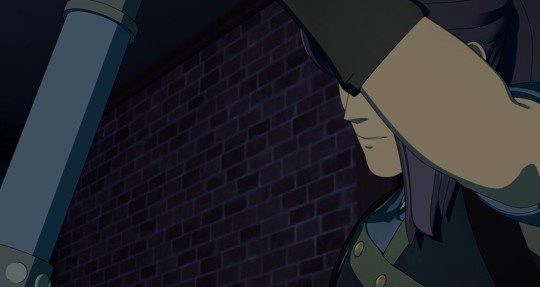
We segue into that montage of him training her for presumably years (Cinder’s hair changes) until we see him giving her the sword in what’s meant to be a moment of pride and trust. Soon after, Rhodes (randomly) comes back to the hotel when everyone else is asleep and hears noises in the back. Moving to check them out, he discovers that Cinder has murdered the two sisters and is in the process of murdering the owner, throwing back the line, “Without you, I am nothing, but because of you, I am everything.” Again, much more impactful if this had been a line we’ve associated with Cinder for years now, not a couple of episodes.
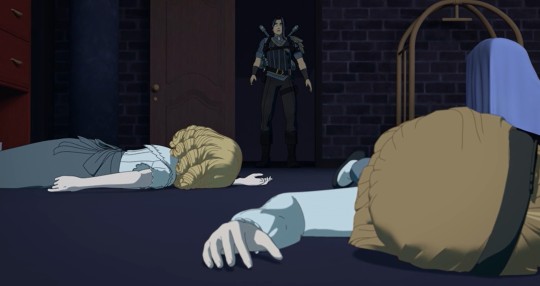
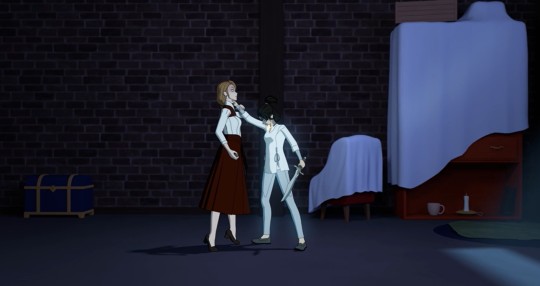
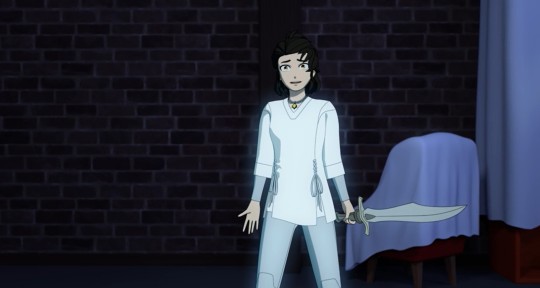
After she breaks the owner’s neck (damn, strong hand!) she tells Rhodes she doesn’t have to run anymore. Cinder clearly expects him to be happy for her and is shocked when he takes out his weapons.

I’m sorry, this is not a “betrayal.” Could Rhodes have just let Cinder go? Sure. Should he have? Given what she becomes, that’s very debatable! Rhodes clearly thought he’d helped her grow into someone who was not inclined towards murder (giving her the sword) and thus is probably going to be a little rattled when he walks in to find her killing three people. Again, there are obvious differences given the level of abuse Cinder seems to have suffered in comparison, but imagine that Glynda, after teaching Weiss for years, walked in on her killing Jacques and Whitley in revenge. Is she supposed to just ignore that? Shrug her shoulders and wish her well? I know a lot of people consider that the “fair” outcome given the inclusion of abuse, but that’s because we’ve had an omniscient view of Cinder’s history and insight into her emotional state. Rhodes doesn’t have that. All he has is his oath as a huntsmen to prevent things like, you know, murder sprees. I’m not going to delve into the overall ethics of a judicial system, either in RWBY or the real world, and thus I’m not going to make any naive claims about it being fair—it’s fucking not—but I don’t think the answer to these systematic problems is, “Why wouldn’t you just let the teenager murder three bad people and then go on her way? She totally deserved it!” Rhodes is not in a position to decide that, which is the entire point of having a judicial system in the first place.
So Rhodes wants to bring Cinder in. Kind of like how Clover wanted to bring Qrow in once he had an arrest warrant. I can’t emphasize enough that wanting to start a legal process rather than letting clearly guilty/potentially guilty people go because they WANT to is not a “betrayal.” Regardless of what teen dramas may have taught us, you don’t have to potentially throw your own freedom and your morals away because you found out a friend is wanted by the authorities. Or you walk in on them currently snapping someone’s neck. There are options other than, “Believe your friend is right without question and help them hide the bodies” (looking at you, Maria, Pietro). Whitely is not insane for going, “Hey, can you not make me an accomplice to a crime by forcing your way in here with a bunch of fugitives?” I’m constantly surprised by the number of fans who can, in one breath, condemn characters for not throwing a middle finger up at the law and in the next praise Jacques’ arrest. Do we want to benefit from this system or not? If yes, that means you have to weigh which laws can be broken (such as in a protest), which should be obeyed (bring murderers and wanted men in), all while working to change the laws that are prejudice and aren’t working.
Anyway, they fight. It’s short and sweet, backdropped by the large clock striking midnight, hence our title. I’m incredibly suspicious of Cinder breaking Rhode’s aura first, given that she’s still the student in training, but here we can more persuasively say he wasn’t fighting seriously, given that he then stupidly rushes towards her without a weapon. Still, that would be the second time now that RWBY has relied on elite fighters “holding back” to explain how the kids in training beat them, the first instance, of course, being with the Ace Ops.
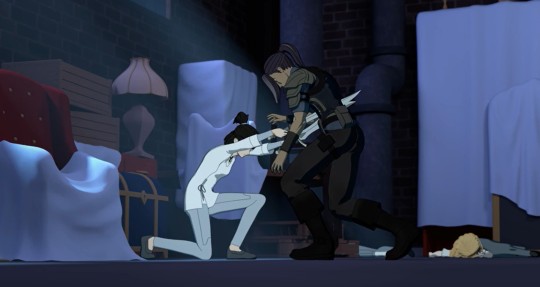
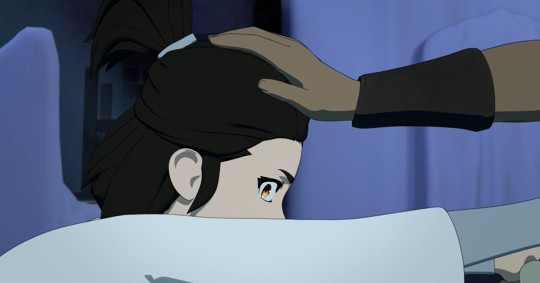
Rhodes does rush Cinder though when she hits the wall and breaks her own aura, clearly concerned. She uses the moment to stab him with both swords. He uses his last breaths to put a hand on her head, conveying that he doesn’t blame her for how this all turned out.
Then Cinder pulls off her collar with a single snap and looks up at the broken moon, crying her single tear.
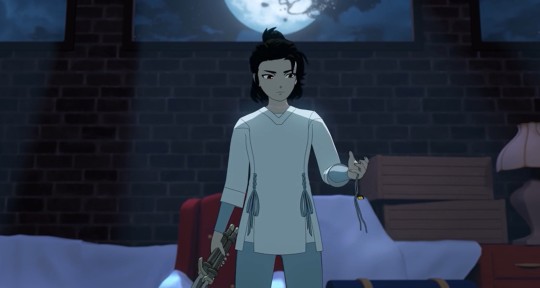
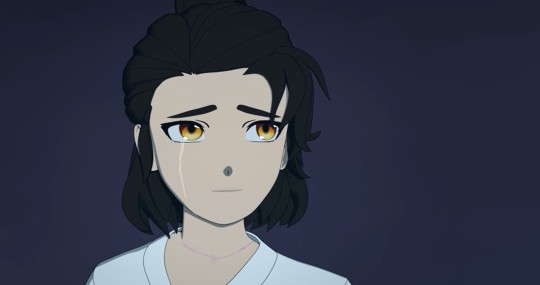
I’m dragging the flashback for multiple reasons, but I want to emphasize that I think this episode is leagues better from what we got last week. Absolute night and day. It’s just that, as always, improvements are incredibly comparative in RWBY. It’s not really good for numerous reasons… it’s just better than what we’ve gotten before. It’s “great” provided you go in with standards buried in the ground.
We then return to the present as Cinder wakes up in Salem’s whale. This scene gives us a great shot of her grimm arm, so cosplayers take note!
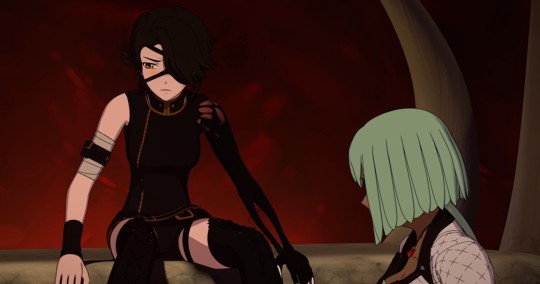
Emerald arrives soon after and immediately rushes to her side, expressing how worried she was. She grabs Cinder’s grimm hand without hesitation. Honestly, I don’t care much about either character… but this single frame activated some sort of ship button in my brain.
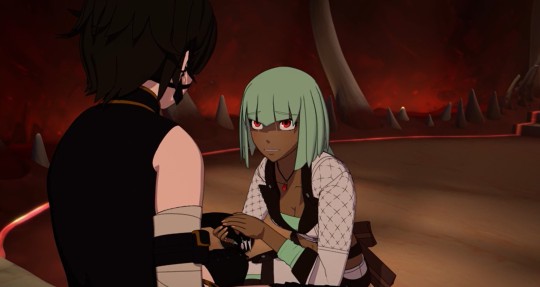
Not fully because I’m personally not drawn to toxic relationships in fiction (which, as I’m about to explain, would absolutely be the case here), but just the tinniest bit. Because I’m a sucker for monstrous people being loved despite their monstrous nature, so having Emerald take that hand over the other is like a ship speed run for me.
I’m predictable, folks.
But we need to talk about less happy things for a moment. I mentioned above Cinder becoming an abuser herself. I hope I don’t need to lay out the laundry list of murders, attempted murders, sabotage, and general taking-over-the-world-ness she’s engaged in since Episode One. Don’t let a sad backstory erase all that. Hell, for all we know the hotel owner had a horrific backstory too! Doesn’t justify how she treated Cinder. The point though is beyond her clear status as a villain, we now know that Cinder treats Emerald just like the owner once treated her.
Cinder was “rescued” from her life on the farm by the owner. Emerald is “rescued” from her life on the streets by Cinder.
Both realize over time that the situation they’re now in is actually worse.
Both reiterate that they “owe” the other “everything,” with Cinder having that shocked into her and Emerald seeming to willingly believe it.
The owner treats Cinder as a slave. Cinder treats Emerald as a slave. “Both of you, get out. I’ll let you know when you’re needed.” The only difference is that Cinder’s orders were things like “Scrub floors” and Emerald’s are “Convince an audience this girl attacked our ally.”
Both use threats to keep the other in line: the owner with her shock collar and Cinder with her Maiden powers. Cinder doesn’t need to resort to violence (yet) because Emerald adores her, but the threat is always there.
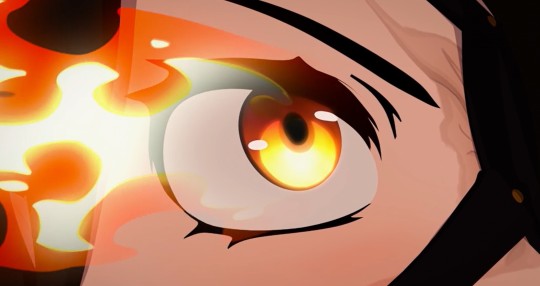
There are even visual similarities this episode, such as kneeling and gem necklaces, though I acknowledge fully that those are just interesting details as opposed to anything like persuasive proof.
The point is that Cinder became exactly what she hated, she just turned the dial up to eleven by going after the whole world instead of a single child. “But Cinder never had a chance to be anything else.” Sure she did. Blake and Weiss are proof of that. Even if we believe that Cinder was doomed to be a villain due to the extent of her abuse, what does that say about the hotel’s owner? We don’t know anything about her history, so what if she was abused too? Does that mean she was always “doomed” to treat Cinder that way? Does that excuse everything she did to her because she supposedly never stood a chance of becoming anything else? Of course not.
Though very iffily done, this is a commentary on the cycle of abuse. Each case is horrific, but it doesn’t excuse what comes later. Every abuser was once an innocent child and every innocent child has the capability of becoming the next abuser. Cinder’s life up until now was beyond awful and yes, she lacked a lot of privileges that others had to help them head down a better path, like Weiss’ wealth. On the other hand, she lacks other difficulties that would make that path harder for others, like Blake’s status as a faunus. Everyone has a choice to make: Will you treat others the way you were treated because that’s “fair,” or will you decide to treat others better than what you were dealt? There are lots of aspects that factor into the likelihood of someone choosing the latter—which is why I really like Rhode’s hand on Cinder’s head, acknowledging his understanding that she’s an abused kid taking the only path she thinks is available to her—but individual agency is by no means removed from the equation. Cinder escaped her situation and decided she’d never be powerless again. What does that mean to her, perhaps becoming a community member who works to prevent abuse like the kind she suffered? No, it means grinding the entire world under her heel until she’s the only one with power left.
This GIF continues to be the only one I need.

(No, the fact that it comes from a cop show and I’m using it for such an anti-law, anti-establishment story/fandom isn’t lost on me.)
(Also, if anyone is curious, this is why I love Ozpin. Out of everyone in this cast, HE has suffered the most, tenfold, and yet he still chooses to be kinder to those than they’ve been to him.)
Anyway, I should really stick to the plot lol. Cinder realizes that her waking up means that they’ve lost, which I still think is BS. Cinder needed a win to come across as a formidable villain again and the likes of Neo, Emerald, and a Maiden with years of practice under her belt should have wiped the floor with a scientist, retirement grandma, and a girl who got the powers an hour ago. But I again digress.
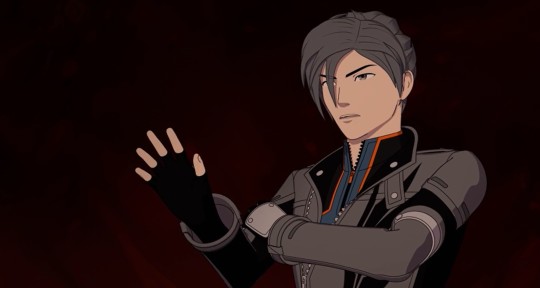
Mercury reveals that he will no longer be following Cinder’s orders because Salem has a special job for him. They’ve all been told to meet on the bridge.
Then we cut to Ozpin and Oscar.
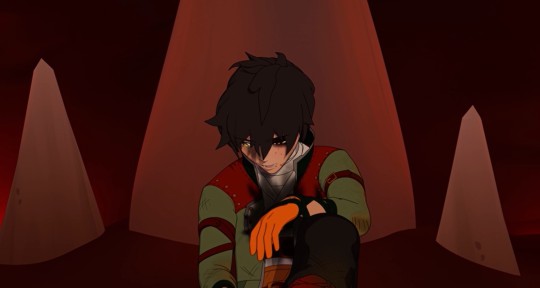
My poor boy is a mess and Ozpin is in the process of begging Oscar to take a “break.” “I would like to express again that this is my burden to bear, not yours.” Take note, fandom. In a few moments Hazel will accuse Ozpin of being a “coward” because “All this time, it could have been you, but you let him suffer.” I just know a bunch of people will be going, “Yeah! Ozpin just let a kid get tortured instead of him. WTF??” Okay 1. We should always be suspicious of agreeing with the takes villains have and 2. Oscar just refused to let Ozpin do that. It is—again—his choice because he thinks that Hazel is “holding back” with him. Oscar is being a brave and logical dude trying to make the best of this situation for both of them. Don’t take that away from him just to make Ozpin look bad. What would we even want him to do? Take control back? The fandom has been yelling at Ozpin for that since Volume 5.
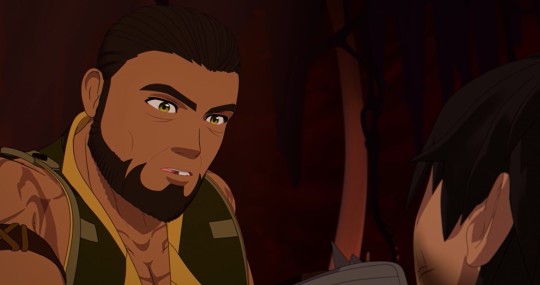
So they’re going back and forth when Oscar suddenly announces that they “can’t leave yet. This is our chance.”
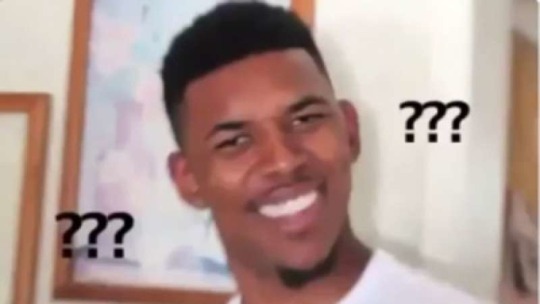
Ozpin even says he thinks Oscar must have taken one too many hits because… yeah. What? Long story short, Oscar recognizes that they’ll never be this close to Salem’s subordinates again and that they should try to undermine her from the inside out, just like she’s done with the world since she knows she can’t take on everyone at once. I love Oscar taking charge here, I love them speaking in unison, I even love the hope of achieving something epic while in captivity despite my own belief that Oscar should break and reveal the Lamp’s password. What I don’t love is:
Another messy, unexpected belief that Salem made her choices because she “knows” she can’t win any other way. Except that—like Ruby’s line in the recording—Salem’s current attack blows that idea out of the water. She IS taking on the whole world. Granted, Ozpin and Oscar presumably don’t know that the whole world literally knows of her existence now, or that Salem was smiling about it, but they do know that she’s attacking Atlas head on. What else is that except a declaration of war with all of Remnant?
The idea of undermining Salem from the inside via Hazel. For anyone who reads my other metas, I just said that this idea wouldn’t work because Emerald isn’t the one torturing him, the one character who has consistently demonstrated hesitation (or, now, Neo). Hazel despises Ozpin so much that he would never listen to him. He despises him so much he doesn’t even see Oscar as his own person… at least he didn’t before. That’s been retconned now with Hazel going “easy” Oscar and having an actual conversation with Ozpin. Whereas before, he was slamming Oscar into walls and screaming about how he’s going to kill the “murderer” of his sister. They basically softened his character to make this plan possible.
The fact that this scene came about without Oscar and Ozpin ever getting to reconcile their problems. Last we saw them, Oscar was saying how he hated that Ozpin came back and refusing to acknowledge their merge. Now, they’re working together like they’ve always been solid allies. I get that the danger they’re in helps to put it all into perspective, but why can’t we get a few lines of them hashing this out? Or at least putting things aside until they’re out of Salem’s clutches? If you don’t need to re-write Hazel’s character with “he’s going easy on me” lines, you can use that space to deal with the conflict we’ve already established. Especially given the strange choice to have Oscar refuse to give up control and be the one coming up with this plan... but then Ozpin does take control and (maybe, see below) enacts it? I feel like we’ve missed huge chunks of this story. As it is, I wonder if RWBY will bother coming back to this. The questions of if/how Oscar will accept Ozpin and if/how he’ll reveal this secret to the group feels like they’re being swept under the rug and it will likely go unnoticed by a lot of viewers simply due to how intense the kidnapping plot is.
So things are a little messy, but otherwise enjoyable, and they’re about to get downright confusing. For me, anyway. See, Hazel reveals that he follows Salem because she can’t be beaten (cue my continued worry about Ruby telling the whole WORLD). She “can’t be stopped. She’s a force of nature,” and Ozpin is fighting a “cause with no victory, no end.” He yells back that “Someone has to try!”—bless this man—and then looks down at the ground going, “Salem can be fought. Unless… she brings the Relics together, if that happens…” and mentions summoning the Gods.
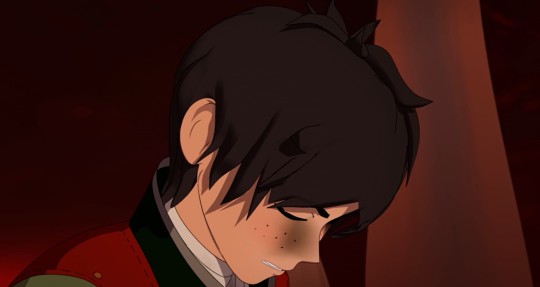
So here’s my confusion. The scene makes it feel like Ozpin is planting some sort of seed in Hazel’s head. He and Oscar JUST got done agreeing to try and undermine her from the inside out, then we get this line that feels like him “accidentally” dropping a secret that will turn Hazel against her. Except… Ozpin doesn’t lie here? The line isn’t useful to them as far as I can tell. They are screwed if Salem gets the Relics. …Right? Because if not, why the hell have the heroes been working so hard to keep them out of her hands? So I can’t decide if:
A) This scene is just written badly and none of this is part of the plan to undermine Salem.
B) Ozpin is going, “NO. Don’t collect the RELICS. That would be the WORST THING EVER /s” in an attempt to trick Hazel into doing it anyway and this is somehow supposed to hurt Salem, despite being presented since Volume 5 as the worst outcome for our heroes?
C) Ozpin specifically wants Salem to make the mistake of summoning the Gods because he thinks he’s completed his task? Or something? But what in the world would make him think that—especially without seeing Ruby’s message (not to mention the lack of unity that mess should cause)—or what makes him think the Gods would just destroy Salem regardless of what he’s achieved? If summoning the Gods was ever a defeat Salem option, why hasn’t he done it before?
I’m leaning towards A just because it makes the most sense by far, but that would also mean we had Ozpin and Oscar decide on this plan, have a chance to start this plan… and then didn’t actually do anything. Yelling at Hazel for following Salem isn’t a new strategy, they were doing that before, so what’s new? Or has the new strategy not been revealed yet? Idk, as happy as I am to see them being BAMF together, I’m slightly unsure about how it all hangs together. I’d much rather have an internally consistent and clear outcome that’s predictable (Oscar breaks or just holds out until rescue) rather than what appears like a super cool, badass, unexpected plot on the surface… but crumbles once you poke at the foundation a bit.
So whether Oscar and Ozpin started this plan or not, they’re dragged into the throne room where they’re forced to kneel before Salem. Yikes. She sits on her throne with the Hound, who I’m only now realizing could be read as a messed up Toto
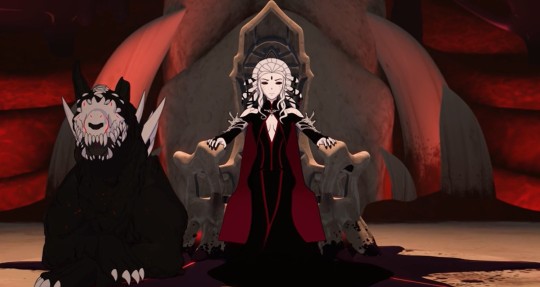
We learn that Tyrian heard from Watts about his incarceration and hacking Penny. What? Okay, I took the time to go back through “Amity” just to find this screenshot.
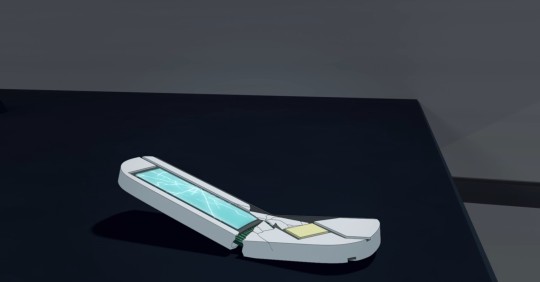
That’s not a working Scroll! Idk what I thought Watts might do with it at the end of last week, but it wasn’t send a full, uninterrupted message to Salem that updates her on everything that’s gone down in Atlas. This thing is toast! Moments like this make me question how much communication there really is between the writers and the animators, despite last Volume’s disaster with Oscar telegraphing his punch like whoa. Are we still getting that level of miscommunication?
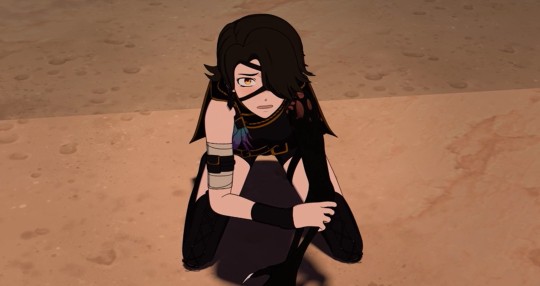
Salem then punishes Cinder for disobeying her by hurting her grimm arm. See, this here (for me, anyway) is the mark of a newbie writer. When the moment first started I went, “Oh nice. Just like the shock collar!” Then the scene made that abundantly clear by cutting to flashbacks of Cinder in her collar. That’s too heavy-handed. We already got the parallel, but then the show went, “Do you get it??” It shows that the writers are too scared that the viewers won’t get it, that their nuance will be lost, so they scramble to make it as obvious as possible, rather than trusting in their own writing.
And if you’re like, “So you want RWBY to be more clear and also… less clear?” the answer is, sadly, yes lol. The things that are already confusing due to retconning and inconsistent themes need to be made explicit, whereas the details that are already strong don’t need an in-your-face, “Okay, but did you really get the parallel here? We’re just making sure.” It’s like launching into explaining why a joke is funny when it’s already landed vs. telling a nonsensical joke and then waiting for the laugh that will never come. RWBY struggles in both areas.
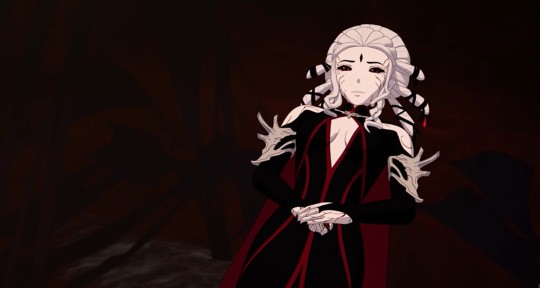
Salem delves into this speech about how this is actually all her fault and she should let Cinder spread her wings or something. AKA, go free Watts and track down Penny. Then you can have your precious Maiden powers.
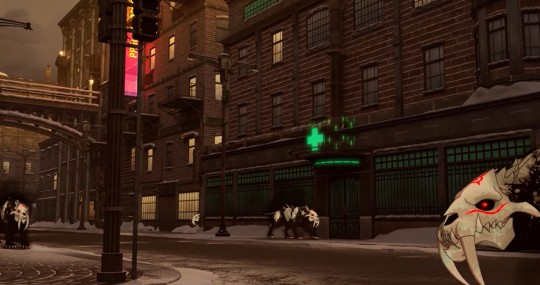
There’s a massive earthquake across Mantle and we watch a + medical symbol go out. Again, heavy-handed. We don’t need that in order to understand that the whole city shaking while the grimm look happily up to the sky is a bad thing.
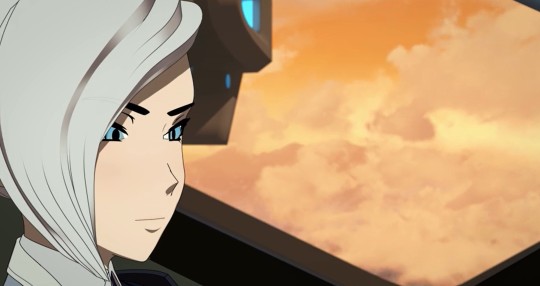
We cut to Winter listening to the Ace Ops complain about Penny. She tells them to act like the elite they are, likely because she hates how they refer to Penny as “junk.” Still being set up to betray Ironwood, I bet. During this scene we learn that they have “confirmed visual of her leaving Amity. She appeared to be malfunctioning.” So Penny is alive? Also, they have eyes on Amity Tower and were able to see Penny leaving, but didn’t see any of our trio coming to launch it in the first place? Did Ironwood want it to launch? Did they see Cinder? I just don’t know.
Before they can get there though a message from Jaune comes through. Serious kudos to Team JNY for asking that “anyone” respond/taking the personal risk of calling for help in the first place. They’re finally putting—as Harriet says—they’re own selfishness aside in favor of the greater good. Yang obviously hates that it’s “you guys” they ended up with, but she’s not outright attacking the Ace Ops or anything. I’m like,
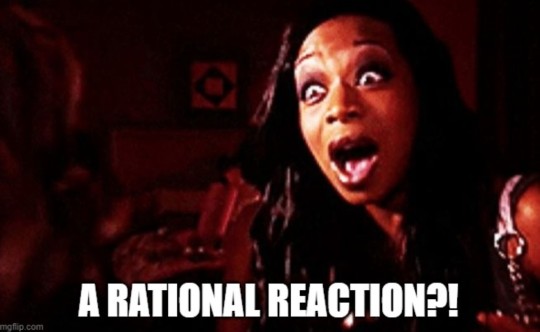
Excellent job, Yang.
Jaune is a little harsh in his panic. He said in his message that a “large mass of grimm” is heading towards Mantle and then when Harriet leads with asking about Penny, wants to know what’s wrong with her. Why are you asking about Penny when lives are in danger and “it’s” (the grimm) are “right there”? Except he, uh… points at nothing. There’s the chasm with (I presume) the weird grimm goo down it? Not sure based on the shot, but the Ace Ops expected a “mass of grimm” and then land to see no grimm anywhere nearby. So yeah, they’re more focused on the missing Maiden than the seemingly imaginary enemy Jaune is freaking out about.
They only get on board when the river launches itself at Atlas.
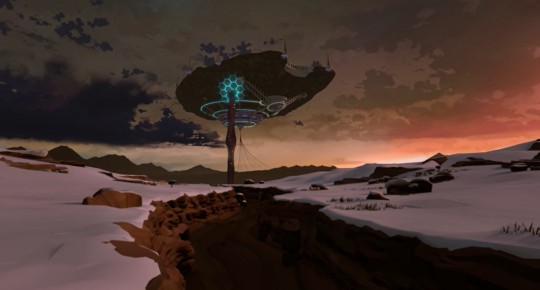
So the goo is, like, sentient before it becomes individual grimm? Or Salem is controlling it from her whale? Either way it’s BAD.
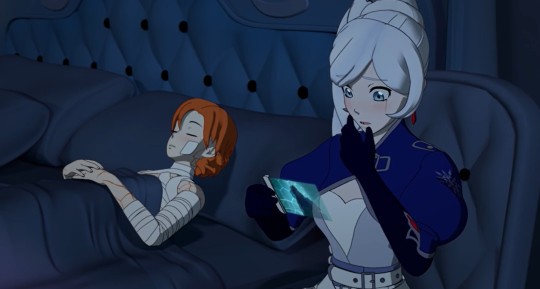
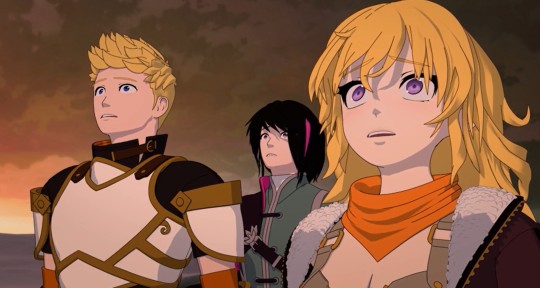
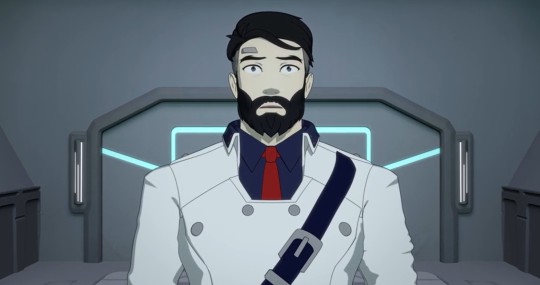
I want to briefly gripe about how the hell everyone is watching this. What, is there a camera conveniently trained on this one random part of Atlas’ underside and everyone’s scrolls tuned into that the second the attack started? It seems far-fetched, to put it mildly. In RWBY’s favor though, I want to acknowledge that we finally have appropriate expressions for the situation! This is good!!
I’m going to level with you all. My notifications have known no peace since I made the mistake of criticizing the adored trio that is Ruby, Weiss, and Blake. I thought supporting Ironwood would get me heat. Nope. Not supporting the main girls is what did it and honestly? I shouldn’t have been surprised. Last week I pointed out that having them smile and, in Ruby’s case, coo during a moment of horror is not good animation and implies some pretty uncomfortable things about their overall sympathy level. The image in question:
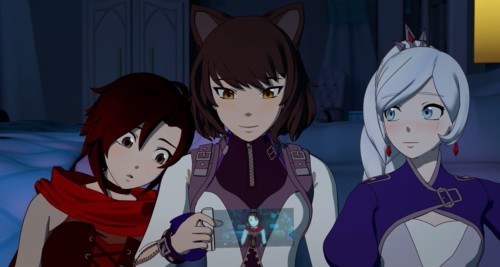
It doesn’t set a good tone, especially when we add in what we’ve gotten for Ruby’s group across the rest of this volume. The counters of, “They need and deserve a break. Why won’t you let them be happy?” fall flat when we ignore that this group has been animated as consistently goofing off post-premiere. Sneaking into the guarded military base of a former friend? Tube shenanigans! Need to find your way around? Funny Penny moment! Semblance reveal? Cutesy chibi explanation! Need to do more sneaking? Silly coffee plan! Nora gets electrocuted? Joke about how awesome that was! Even Wiess telling Whitley to go to his room reads as funny to the audience.
Ruby in particular has been a problem, given that she’s our main character and the others’ leader. We take our emotional cues primarily from her. Alongside being a part of all these fun and games, her animation during more serious moments has been less than stellar. This is Penny when Nora goes down.

This is Ruby, Weiss, and Blake. No worry, just focused on the fight.
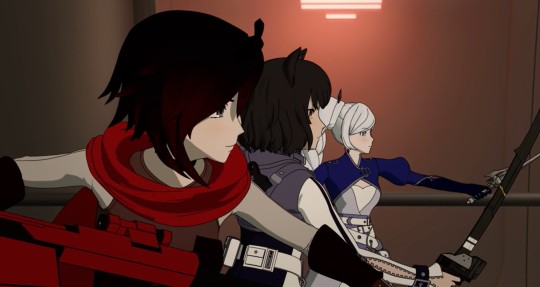
This is Penny when the fight is over.
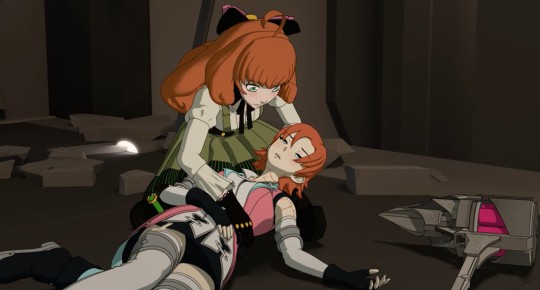
This is Ruby, Weiss, and Blake. No worry, just chatting about suspicious activity.
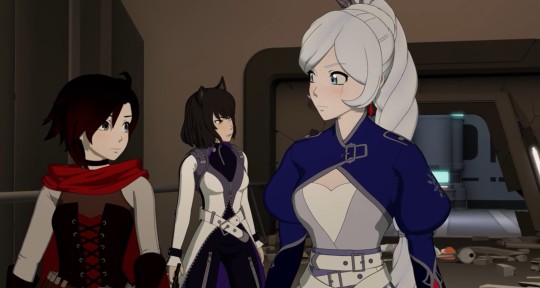
This is Penny in the airship, worrying about Nora and the situation they’re in. This is also Ruby in the airship, apparently not worried at all.
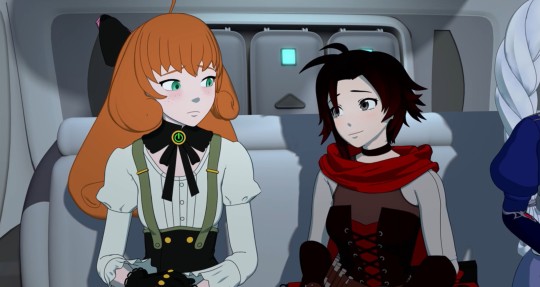
This is Ruby when she learns her uncle is in jail. Is there shock? Fear? Horror that he might be in serious trouble? No, she just maintains the same emotion she had before: fury at Harriet.
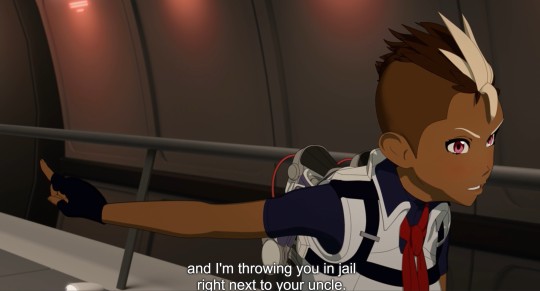
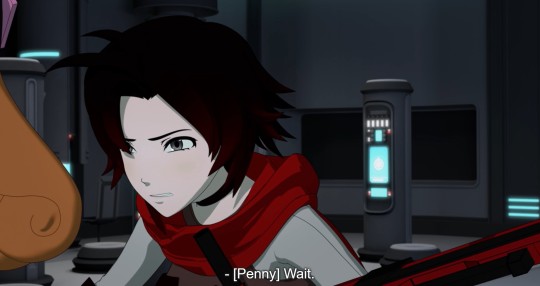
So when we reach them watching the recording and they look like this:

No, I’m not convinced that this trio is taking the situation seriously, or that they really care about the people involved. I know they’re supposed to care, they all obviously care from a meta perspective, but the “obviousness” of that only exists in our personal understanding of the characters if we don’t see it on screen. I completely believe that Penny is worried about Nora because she’s animated expressing that worry. I completely believe that JRY are in the middle of a warzone because they’re (mostly) animated as fearful and angry. The rest of Ruby’s team has a scared line from Blake and Weiss holding Nora’s hand, whereas the majority of the emotion across this adventure has been indifference or playfulness. That’s a problem given how horrible the events of this Volume have been, most of which the group is aware of.
All of which is an incredibly long-winded way of saying that this
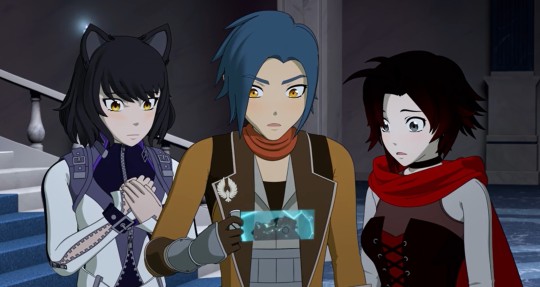
finally feels appropriate. Well done, RWBY.
Alright, this recap is already over 7k long so I want to return to our plot with the summarized: IRONWOOD WAS RIGHT. He said they couldn’t withstand a head on attack by Salem and he was right. It literally took seconds for her grimm to burrow into Atlas, knock out a tower, and disable the shield. Everyone still claiming that leaving is useless because it’s oh so obvious Salem’s grimm could fly however high it wants (when did we learn that?) are ignoring that leaving was at least a plan with some kind of hope attached to it. And, given her focus on the Staff, may have saved Mantle by drawing Salem’s attention away from the city. The point is we don’t know. All we do know is that Ironwood tried to do something in the face of hopeless odds, Ruby’s team stopped him, and now look, everything is awful. No one could have possibly seen that coming.
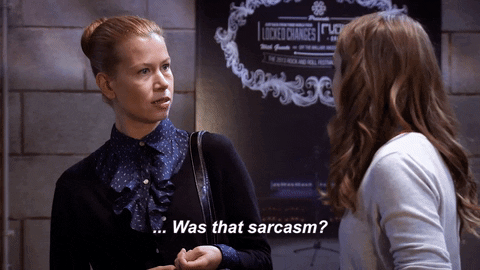
Salem: “It’s time.”
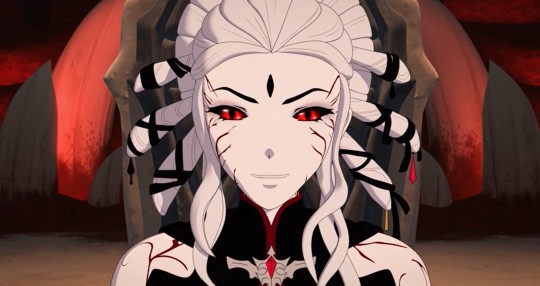
I’m very pleased that Salem is finally using the tools at her disposal. Upon reflection, I still don’t buy why she had to wait. “Well, she was waiting for the grimm goo.” She couldn’t have used flying grimm to take out the tower? Take a burrowing grimm and give it wings? She couldn’t have used the goo that was apparently inside her whale the whole time?
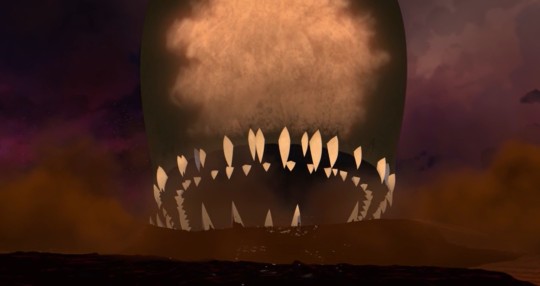

It’s all very convenient. In the sense that we’re drawing out the volume by having the villain inexplicably hang back, despite not having a good reason to. In the sense that—unless Ruby’s message comes back to bite her—the villain’s passivity also conveniently let the heroes accomplish the one goal they were desperate to achieve. All of that’s still not good, but at least the Volume seems to be moving out of the “not good” category and into the “slightly better” territory.
Although, as I just acknowledged to a friend, RWBY seems to alternate for me. Every time I have an episode where I think, “Okay, there are still massive problems here, but I can see a glimmer of hope” the next episode is inevitably the pits.
Still, grabbing onto that hope with both hands: Atlas should be decimated, folks! Grimm are swarming, our idiot heroes herded everyone directly under the city, the world should be panicking, and the cold should still be killing people if the story remembers that it exists. At this point my only question is wtf our heroes are supposed to do next, but regardless of what the plot gives us, it’s going to be wild. You all know what’s coming. Next week is our final episode before a two month hiatus, which means we’re going to witness all kinds of awful and then end on a six week cliffhanger. It’s inevitable, so best to emotionally prep for that now lol.
I don’t believe we have any Bingo updates, with the exception of edging towards a few: “Winter betrays Ironwood,” “Army of grimm conveniently doesn’t kill any civilians,” “Atlas somehow survives,” and “Ironwood dies” being the most notable. We’ll have to see what, if anything, gets checked off next Saturday.
As always, thank you so much for reading (I feel like I don’t say that enough :D) and I’ll see you next week! 💜
[Ko-Fi]
93 notes
·
View notes
Note
Have you noticed over the years that the SJW stuff is seeping into STEM?
Wow, that sounds like a right-wing conspiracy theory to me that must be dismissed and never spoken of again. As long as you ignore all the following examples of social justice seeping into STEM, there is no evidence of social justice seeping into STEM.
In a 82-page training manual titled “A Pathway to Equitable Math Instruction: Dismantling Racism in Mathematics Instruction”, the Oregon Department of Education plans to root out “white supremacy” in mathematics, by not asking students to show their work or placing any emphasis on getting the right answer, which will stop white supremacy from “popping up in the classroom.” The racist implication is that non-white students are incapable of “showing their work” or “getting the right answers,” and so teachers must scrap the academic bar altogether. To fight such white supremacy, math teachers are urged to accept TikTok videos from students instead of math work. The Bill and Melinda Gates Foundation fund the training.
Seattle public schools created a framework to protect children from racist and “oppressive mathematical practices.” Included in this report, educators and students will learn, “How important is it to be Right? What is Right? Says Who?“, “Who holds power in a mathematical classroom?“, “Can you recognize and name oppressive mathematical practices in your experience?” “Who is doing the oppression?” “Who does the oppression protect?”, “Explain how math and technology and/or science are connected and how technology and/or science have been and continues to be used to oppress and marginalize people and communities of color.” The Seattle school district also put into place a K-12 curriculum that encourages students “to explore how math has been ‘appropriated’ by Western culture and used in systems of power and oppression.”
The Department of Mathematics and Statistics at Wake Forest University now offers a “racist and anti-racist uses of math and statistics” class because “The time has come for us to focus on fighting racism and making plans to create a more equitable educational space.” In addition to the new anti-racism math class, the math department at Wake Forest has placed a declaration at the top of its webpage that affirms Black Lives Matter, pledges to try and hire more faculty of color and launch microaggression trainings, and organize a math/stats colloquium on social justice.
The University of California now require ‘diversity contributions’ and statements from future math professors. Applicants are asked to write a statement in which they explain how they will advance the university’s diversity plans. “The Division of Physical Sciences has a strong interest in ensuring that all candidates hired have the professional skills, experience, and/or willingness to engage in activities that will advance our campus equity, diversity and inclusion goals.” The purpose of the diversity statement as a method of evaluating a candidate’s “awareness of the barriers that exist for groups historically under-represented”, “past efforts in diversity and outreach activities” and “future plans to enhance equity, diversity, and inclusion in higher education.” One math professor at the University of California, Davis, wrote in opposition to the required “diversity statements,” referring to them as “using a political test as a screen for job applicants.”
The Mathematical Association of America released a statement in which it argued that mathematics contains “human biases” that can only be corrected by promoting critical race theory to math educators and students.
A math education professor at the University of Illinois argues that the teaching of math subjects such as Pythagorean Theorem perpetuates white privilege because they were developed by Europeans. “Mathematics itself operates as whiteness and who is seen as part of the mathematical community is generally viewed as white.” He also argued there’s no such thing as objective truths.
A Math Education professor from Brooklyn College argued that the "trope” of “2+2=4 reeks of white supremacist patriarchy.” It was also promoted by several academics at colleges around the nation, with another suggesting math should be reevaluated because it was primarily developed by white men. He also complains that “meritocracy” in math classes is a “tool of whiteness.” Teachers who claim color-blindness - that is, they claim to not notice the race of their students—are, in effect, oppressing them. “By claiming not to notice, the teacher is saying that she is dismissing one of the most salient features of the child’s identity and that she does not account for it in her curricular planning and instruction.” He recommends that math teachers incorporate more social justice issues into math lessons, but warns that even “teaching for social justice” can be a “tool of whiteness” if teachers are not sufficiently sympathetic to minority students.
A University of Rhode Island professor claimed that science, statistics and technology are inherently racist “because they are developed by racists living in a racist society, whether they identify as racists or not.” The professor also recently came under scrutiny after condoning an Antifa member killing a Trump supporter last year. After a commenter called him out for his position on his post, he replied “He killed a fascist. I see nothing wrong with it, at least from a moral perspective.”
Duke University has a new computer science course that will focus on race, gender, and class within the world of computing, in order to change the “working environment” of the field. “This course explores the diversity, equity, and inclusion challenges in computing through an introduction to and analysis of various social constructs and their impact on not only computing departments and organizations but also the technologies developed. This course also introduces students to cultural competence in the context of computing.” “We have to change the mindset of a workforce that is overwhelmingly white, Asian and male.”
A group of mathematics professors argued in their published book that math teachers must “live out social justice commitments” to fight privilege in the classroom. Math teachers, “must learn how to advocate for students, self-examine for biases, and strategically subvert the system in which they teach to counteract student oppression,” adding that the development of “political knowledge” is key. “Any amount of connection to issues of equity, diversity, social justice, and power is better than none at all.”
Activists persuaded top science journals to stop work for a day and to validate their claims of “white supremacy” throughout the American science sector. The small group of black academics and scientists demanded that science be “reorganized” for black Americans as they pushed the hashtag #ShutDownSTEM. One of their manifestos demanded that the goal of “justice for black Americans” be prioritized above scientific discovery and objective reality. Another manifesto portrayed all scientists who put science first are racists: “Unless you engage directly with eliminating racism, you are perpetuating it.” In response, two of the leading science publications, Science Magazine and Nature, agreed to not talk about science for a day and instead use their Twitter accounts to post the demands and claims by the radicals.
A physicist at the University of Zaragoza is using cross-dressing drag to “empower” minorities in science and technology fields. In an article on the website, Lady Science, he says drag is still uncommon in scientific fields, because “sexism, racism, ableism and LGBTphobia remain very much alive in academia.”
A recent paper published by a team of various college professors makes the case that STEM courses should be made easier for female students. The researchers argue that “gender” inequities in the STEM majored could be lessened by artificially inflating grades. The study claims that the STEM fields would see an 11.3 percent increase in female students if STEM classes practically erased grading.
A Vanderbilt University professor complained in an academic journal article that the field of mathematics is a “white and heteronormatively masculinized space.” In the article titled Unpacking the Male Superiority Myth and Masculinization of Mathematics at the Intersection, he argues that the apparent “gender gap” in mathematical success is socially constructed. He concludes by expressing a hope that future analyses of gender in mathematics take a more “intersectional” approach, after noticing “intersectional considerations of mathematics achievement and participation shaped by whiteness and sexuality” were left out of many of the studies he reviewed. Intersectionality theory from black feminist thought, he adds, can allow for “more nuanced analyses of gender” and its relation to mathematical performance.
Auburn Drive High School in Canada offers a class in “Africentric” mathematics. It incorporates “discussions about the students’ cultural backgrounds, history and their lived experiences,” all the while teaching them math and associated concepts “through an Africentric lens.”
A scientific journal retracted a professor’s article which criticized hiring based on skin color and sex, leading to apologies from both the journal and the professor’s university. The professor had wrote, “The rise and emphasis on hiring practices that suggest or even mandate equality in terms of absolute numbers of people in specific subgroups is counter-productive if it results in discrimination against the most meritorious candidates.” The journal withdrew the article “amid a backlash” and reassured the professor’s “views do not reflect our values of fairness, trustworthiness and social awareness,” and added they “stand against discrimination, injustices and inequity.”
Two national mathematics organizations are on a mission to prove that math education is “unjust and grounded in a legacy of institutional discrimination.” The National Council of Supervisors of Mathematics and TODOS: Mathematics for All, aim to “ratify social justice as a key priority in the access to, engagement with, and advancement in mathematics education for our country’s youth,” the groups declared in a joint statement, elaborating that “a social justice stance interrogates and challenges the roles power, privilege, and oppression play in the current unjust system of mathematics education and in society as a whole.”
Students at the Claremont McKenna Colleges staged a protest to make it known that objective truth is a ‘white supremacist’ myth devised by “white supremacists” to “attempt to silence oppressed peoples.”
Boston Public Schools have suspended their advanced academic program due to racial ‘equity’ concerns. Acceptance to the program was decided on standardized grade test scores and the successful students would be required “to study in greater depth, with more schoolwork and more home study than the traditional curriculum.” Because 70 percent of students in the program were white and Asian, the program was scrapped. A committee member said she was “very disturbed” by the racial statistics and noted they are “just not acceptable.” The superintendent said “There’s a lot of work we have to do in the district to be antiracist.” Advanced programs for gifted students often are targets either for complete abolition or restructuring due to “incorrect” racial and ethnic demographics.
A recent Washington Post article lamented the fact that biology textbooks contain a disproportionate number of “white men.” “They’re all men. They’re all white, and are written from a very white perspective.”
Cell, a prominent science journal, published a statement accusing their entire discipline of racism. “Science has a racism problem,” they assert, apparently concluding that underrepresentation of a given ethnic group must equate to a deliberate wrongdoing against that group. “Cell stands with our Black readers, reviewers, authors, and colleagues. We are committed to listening to and amplifying their voices, to educating ourselves, and to finding ways that we can help and do better. We alone cannot fix racism.” They go on to list all of the affirmative action changes they can make.
Fordham University’s Political Science department announced it had voted to adopt a new policy that mandates professors must use a student’s “preferred” name and pronouns. The decision was announced just two weeks after student activist groups demanded that the university publicly “resist transphobic rhetoric.” The activist students were inspired to make these demands after reading an article by the New York Times, which reported that the Trump administration had been considering defining sex as “male or female based on immutable biological traits identifiable by or before birth.”
The National Council of Teachers of Mathematics states on its website that “mathematics teachers should “reflect on their own identity, positions, and beliefs in regards to racist and sorting-based mechanisms” and “notice students, learn about the worlds they live in, and build mathematics that comes from these worlds.” They also hold webinars titled “Developing Social Justice Mathematics Activists in Pre-K-Grade 5,” its description states that “mathematics should become a social justice tool that empowers students to mathematically recognize and address oppression they see in their own world.”
Wayne State University, Detroit, dropped math as a graduation requirement and is replacing it with mandatory “Diversity courses.” UCLA also approved a “diversity graduation requirement,” which stipulates that every student in the College of Letters and Sciences take a course about “inequalities based on race, ethnicity, gender, sexual orientation and religion, among other factors.”
Radical Math is “a resource for educators interested in integrating issues of social and economic justice into their math classes and curriculum.” Radical Math boasts over 700 lesson plans, articles, charts, books, and websites that cover a wide range of socio-political issues from redistribution of wealth to racial profiling.
A professor at the University of California-Davis has vowed to “challenge the authority of Science” by “rewriting knowledge” through a feminist lens. Science, she worries, has “earned its epistemic authority through its co-constitution with colonization and slavery,” and therefore “relies on a colonial and racialized form of power.” Not only is science rooted in racism, she alleges, it has been used to perpetuate racism and colonial practices. “At the root of the justification for social inequality then is Western science,” she says, claiming that science’s distinction between “humans and non-humans” has allowed “capitalism to be justified as a natural economic system.
The New York Times published an article highlighting several academics who say “Earth Science has a whiteness problem.” One of them, from Columbia University’s Lamont-Doherty Earth Observatory, said white geoscientists should help increase a “sense of belonging” among non-white groups by “separating their privilege as a white person from their identity as a good person.” Another, who helped create a book club which fellow geoscientists talk about “race and white privilege,” added that earth science classes could be “enriched” by more Native American voices since “Indigenous people have a unique connection to the land.”
University of Wyoming added a diversity course in geosciences meant to address a lack of diversity within the field. The course was the result of a diversity survey conducted by the university in which 67 percent of faculty responded that diversity, equity, and inclusion classes should be required for all students. “The primary goal of the class is to raise awareness that lack of diversity, equity and inclusivity is a problem in our scientific community and in academia in general. The lectures aim to make students think about implicit bias that we often have and don’t recognize and students have the chance to learn from life experiences of scientists from underrepresented groups. The systemic racism that is present in our society also is present in academia. Black, Hispanic, women and LGBTQ scientists are disproportionally underrepresented in the student and faculty population, and students from underrepresented minorities are often the target of microaggressions on campus.”
The National Science Foundation is paying for a multi-million program at Drexel University to help teachers learn how to work social justice into their classrooms. “This project intends to promote social justice teaching, which emphasizes connecting science, mathematics, and engineering instruction to students’ personal experiences and culture. The long-term and far-reaching benefits to society of this project are the potential to document and share sustainable approaches, steeped in the context of social justice.”
The University of Louisville had an opening in its physics and astronomy department, but it ruled out white and Asian applicants. “University of Louisville is an affirmative action, equal opportunity, Americans with disabilities employer, committed to community engagement and diversity, and in that spirit, seeks applications from a broad variety of candidates. The Department of Physics and Astronomy announces a tenure-track assistant professor position that will be filled by an African-American, Hispanic American or a Native American Indian.”
UC Santa Cruz hosted an event called “Research Justice 101: Tools for Feminist Science” where “Participants will be challenged to apply principles and practices of justice to their own work, interrogating questions such as: Who benefits? Who is harmed? Who is most vulnerable? And ultimately, who do we do science for?” The workshop concludes with practical skills and resources for participants to push their research “to be more inclusive, equitable and attentive to social justice.”
A professor at the University of Illinois-Chicago wants others to teach “math for social justice” to help fight the “oppressive status quo” in the United States. He argues that teaching “critical mathematics” isn’t an option for math teachers, but rather a “responsibility to our future.” “We have a responsibility to our future and our planet, to life and all species. What we do in the classroom matters, for today and tomorrow, and the myriad possibilities for resistance and transformation.” “In my work, I argue that K-12 students need to be prepared through their mathematics education to investigate and critique injustice (such as racism and language discrimination) and to challenge, in words and actions, oppressive structures and acts.”
Central Connecticut State University is running a contest, asking students to "express their personal connection to the Black Lives Matter Movement” and reassures students that it’s lowering the racist grammatical standards for the contest. On the website, the school notes “submissions will not be judged on traditional literary or grammatical standards.”
A science education professor at the University of Arizona believes elementary schoolchildren are being taught “heteronormative” and “limited” ideas in science classrooms, and queer theory curricula is the answer. She explores in her lectures how “inviting sexuality into the elementary science classroom” and “queer theory can be useful tools for re-imagining elementary science education and elementary science teacher preparation.”
An academic journal article suggested appointing a “Safety Officer” and rewarding participation in “diversity programming” to combat “gender inequity” at scientific conferences. “Addressing gender inequity should be a primary consideration for all societies hosting conferences, yet many STEM conferences are struggling with gender biases and the understanding that gender inequity also applies to non-binary gender identities and intersectional diversity/overlapping social identities.” They call for the introduction of a gender-based Code of Conduct for all attendees to abide by, appointing a “safety officer” at each scientific conference to make it easier for people to report if they feel they have been subjected to harassment or discrimination, and paying the cost of travel for women who wish to attend the conference.
The director of libraries at MIT argued that tech workplaces need to ditch “Star Trek” posters and other geeky stuff to be more inclusive and welcoming to women. “Replace the Star Trek posters with travel posters, don’t name your projects or your printers or your domains after only male figures from Greek mythology, and just generally avoid geek references and inside nerd jokes. Those kinds of things reinforce the stereotypes about who does tech.” She is a self-described “butch and queer” cis woman and “the work of libraries and librarians is to support feminist research and agendas. She also complained that “A profession that is 88% white means 5000% agony for people of color, no matter how liberal and enlightened you think you are.” She also said we need to have “a f**king reckoning about the pain we cause, and that we need to do some hard work on decolonizing our organizations and our professions.”
PLUS ignore these hundred other examples.
33 notes
·
View notes
Note
1/7 MM okay gotcha gotcha. I was thinking about this on a smaller scale, where i don't think discussing racism in supernatural should be "fun and interesting" (phrase you used in your original post that rubbed me the wrong way b/c [hot take] I don't think racist tropes reminiscent of the Birth of a Nation and the policing of poor black communities are fun and interesting. they're horrible. but, like you said, we shouldn't shy away from horrible things), but no yeah i get what you're saying about
2/7 people showing the same enthusiasm, willing participation, and depth when talking about this stuff as w/gender&sexuality. I agree with that AND it's important to keep in mind, especially with a fanbase that's largely white, whom these analyses are for and who is writing them (b/c a white person's racial reading isn't the same as a bipoc's). But, again, that's on the smaller scale, which appears to have more to do with personal accountability and discussion norms.
3/7 AND i also get what you're saying about using the entirety of supernatural to examine "american attitudes about the Other" and how that needs to be broken down in ethnic/racial/culture identities just as it is with queer indentities and yes i agree. as for the marketing/monetary engagement thing, i may have been speaking out of turn there because i don't know a ton about marketing or audience appeal and i also wasn't invested in all the spn meta/BTS stuff until recently.
4/7 what I said was purely my observations of the very specific 'spn renaissance' tumblr circle, which appeared different from the, say, twitter circles that pay for merch and whatnot (again, this may not be accurate, it's just from what i've seen). HOWEVER, that being said, if we're speaking specifically about the long-term, /larger/ cultural impact supernatural has, I 100% agree that it needs to be recognized and condemned as a racist and all-around patriarchal show. I did forget that spn made
5/7 so many headlines about both queerbaiting and having a queer character or whatever, and the same headlines need to be made about how it treats bipoc and other minorities. Although supernatural is a mess and considered cringey and a dead horse, it still holds a significant amount of power and (at least some) reputability in media. and this is all despite its misogyny and homophobia and cisheteronormativity (this is the case for so many shows, not just spn). I guess i was just concerned about
6/7 'ok, what if mainstream starts having these conversations about racism very specifically in a way that normalizes it and makes it seem hatecrime-but we'll-allow-it,' so now we have this monster of a show that KNOWS it's racist but doesn't really care. But it's equally as terrible to not point it out. But it doesn't matter anyways, because the show is over now, and it's not like they're gonna give reparations to the actors they killed and the people they hurt. your point about us having these
7/7 conversations (in a way that does not make it seem like like fun ideas to ponder over) being the only thing we CAN do to lessen the power the White Narrative of Supernatural (both meta and in-text) really resonates, and i hadn't thought of that but i totally agree. in other words lmao, fuck this show
yeah “fun” might’ve been the wrong word choice for all the reasons u gave i really didn’t mean to trivialize racism as a discussion and i see what u mean especially w how people have responded to the homophobia of supernatural me included like saying oh its homophobic but its funny so it’s fine and ur absolutely right that we Cant allow the discussion of race to go the same way (and honestly ur intuition was right bc in the tags of that post theres white people saying we SHOULD take it as lightly as the homophobia). so yeah the phrasing was my bad
but my general point stands. like i personally find it really fulfilling and interesting to talk abt how supernatural (and other fiction) replicates these american ideas about the Other bc supernatural is a FASCINATING microcosm of american culture (and of course in part bc i Am an american other)! and that post was mostly in response to how white fans seem to shy away from these extremely complex and interesting conversations bc they consider discussion of racism a chore like something they Have to do so they can say “it was bad that they killed off kevin tran. see i engaged critically! now back to the meta that relates to Me and My experiences”
and of course the analysis that becomes generally accepted and talked abt by fans shapes the actual presence of the show in pop culture. so we should do our best to write good and thoughtful and compassionate analysis of EVERY aspect of the text, especially one so deeply embedded as the race element.
basically yeah ur right and i think we pretty much agree. fuck this show! thank you for sending me these messages by the way im glad we could talk this out :)
#i think this might actually be the most productive conversation ive ever had abt a piece of fiction lmfao#asks#crit
26 notes
·
View notes
Text
Shadow and Bone Season 1 Review
Ok so I got distracted by a need to watch all of Ben Barnes' filmography (lmao) but here is my review :
It was really fun to watch and it was clearly made with love which is already the main thing with YA fantasy, which is often turned into a soulless moneygrab when put on screen. The actors were GREAT. I did think that the Crows suffered from being mashed up with the Shadow and Bone story, but they were still a highlight. I also think it was a bit rushed, esp. when it came to Alina's training. The costumes were beautiful, I want a kefta now. Plus the crossover fanfic interactions btw the SaB characters and the Crows were just pure joy. Also Milo, obviously <3
I'm in hyperfixation mode so here, have an essay :
The "Shadow and Bone" Characters :
- Jessie Mei Li !!!!!! She really made me like Alina so much more than in the books, she absolutely is the 'human embodiment of literal sunshine' and she was a joy to watch. Her character's arc is cliché but her acting is so expressive and endearing, I really felt for her all the way through. (maybe I'm biased bc Jessie talking about her ADHD and seeing her thrive at the same time is like!!! i love them they deserve all the best.) I like that they made Alina more proactive - even though she does make some stupid decisions... but I just don't understand people who put that down as bad writing, like ??? have you ever met a real person who only makes wise, good decisions ?? a character like that would either be at the end of their story or just in the background because that makes them static. The things with the maps in the beginning does a good job of illustrating how she is just this one girl making rash, erratic decisions out of fear and loyalty and doesn't have a sense of the bigger picture, caught in the tide of bigger events. It works for her character. When it comes to the choice of making her half-Shu, I do think it really makes sense re: her character feeling like an outsider but I do understand the criticisms that the microaggressions felt too relentless and one-note. I am really looking forward to them introducing Tamar and Tolya and hopefully connecting to them over her heritage in a more positive way.
- Mal in the books was one of the most annoying YA characters I've ever come across, so I really liked that they made him much more of a loyal, devoted friend. I found his relationship with Alina cute, it really gives us the sense that these are two orphans who found a home in each other, childhood best friends (and potential sweethearts) separated by war, two army grunts and ordinary people caught up in the wheels of power and war that usually crushes people like them, it's a great way to introduce the dynamics of their world and it's a trope that always makes me emo. It felt a bit too one note to me, though, and too heavily on the nose, like Mal's only personality was his attachment to Alina (and his resentment towards the Grisha) and too much of her emotional arc also relied on him. Them hitting us over the head with the meadow scenes felt like pure telling instead of showing and it ended up being super repetitive and kind of annoying. I am willing to like this pairing, but I wanted more scenes of them just having conversations about things and really understanding why they like each other beyond the whole childhood friends bond that we're asked to accept exists at the beginning. So I hope there's more depth there in next seasons.
- Ben Barnes!!!! Just jksdfhgkdjghdf. I'm not a big villain stan usually and I hated the Darkling in the books but DAMN his performance is just amazing. They managed to make him more sympathetic and human while at the same time making clear the stuff he does is deeply horrible. There's the Magneto-aspect of 'well clearly his methods are fucked up but he's addressing a terrible injustice nobody is doing anything about' that makes it very tempting to root for him ; and again, well, like, Ben Barnes is so hot and charismatic it feels uncomfortable (which I guess is part of the point lol). His loss of humanity is, up to a point, understandable, brought about by despair, loneliness, grief and a sense of powerlessness - living so long he starts to see other people as disposable, losing so many people he stops caring, seeing over and over how hate never seems to stop, etc. It's a logical explanation for going insane.
But the hunger for power is also very much present as a motivation and this ambiguity is there constantly. Does he maybe come to genuinely care for Alina or is it totally bullshit ? I think he does, he's just so fucked up that it comes out as possessiveness and a need to control her. He wants Alina to be his equal but he's incapable of treating her that way. It's tragic, in a sense, but the show doesn't excuse his actions either. Like his monstrosity is a product of this world full of injustice, yes, and that warrants some compassion, monsters are always a symptom of their environment in some ways and dehumanizing them completely is an excuse ; but at the same time, he sabotaged his own cause anyway the moment he started to treat other people like things, as he does with Alina, because that just perpetuates the cycle of violence and hate. At some point he started feeling like he was the only solution and he was owed power for his sacrifices, and he's using his cause as an excuse. When Alina came to him, there was a possibility for redemption, taking down the Fold, and it's a test because there is finally someone on his level of power. But instead of seeking to remedy the power imbalance between them, he made it worse, by lying to her, manipulating her, etc, and the antler collar is the ultimate sign of this.
I love those scenes towards the end (the antler-based body horror has big Hannibal vibes, so messed up). I like Alina telling him they could have had this, that she had compassion for him and his cause, that they could have worked together, and he's the one responsible for screwing it up and this time his claim that he's the misunderstood victim ("Make me your villain") appears delusional and self-serving instead of somewhat justified. The almost-lovers to enemies vibes, the sense of lost potential, and the angst of the whole 'oh you could finally have been loved by people, too bad you fucked it up !', very juicy. There is this fundamental idea that power/respect/love is not something you are owed no matter how good your intentions are or because you're strong or you have suffered or you're willing to commit horrible drastic actions, you have to keep proving you deserve it, and trying to claim power without responsibility of care turns you into a monster. The thing with the stag was an excellent metaphor of the fact that there's things you can't take, they have to be given to you, and the wonderful power there is in understanding that is what allows Alina to harness the stag amplifier's power. This is really when she escapes his grim utilitarian outlook and a different way forward and owns her own power fully on her own terms.
Anyway I hope Alina gets to beat the shit out of him at some point that would be very sexy but I'm also looking forward to see how their arcs parallel and diverge from each other as Alina starts to grapple more with the implications of her power and the harsh dilemmas of war and her own dark side. I want to see him become scared of her, and I feel it will be more visible than in the books where he just has this cold aggressive facade all the time. This one feels a lot more openly emotional which is just a lot more interesting.
- As for the other characters ; Zoya mostly made me sad. The actress has the perfect vibes but I'm not sure I love their take on her character so far, it does make sense in terms of the later books - that she has internalized prejudice regarding her mixed-race heritage, that she is jealous of Alina because of how hard she's fought to get where she is and Alina kind of takes it away from her, etc. But I would have liked to see a bit more of her being badass and sharp-tongued in a clever (even if mean) way instead of spending most of her time being rejected by men and being racist towards Alina. I did like the ending though, of her actually seeing the monstrosity of the Darkling in action and the mention of her aunt. And her brief bonding with Inej was great, just because it was badass but also maybe because it could be a part of Zoya learning to accept her Suli heritage in turn, maybe not right away but in time, when thinking of that part of herself, she won't only think of her parents' ruined marriage and all the pain it caused, but also of that badass and brave acrobat girl who went toe to toe with these really scary monsters without even having any powers and !!!!!
- Also Leigh's cameo was so cute and as an aspiring writer this is just such wish fulfillment
- I honestly think that having the Crows there actually made the S&B story better ? Not only in terms of the much needed levity breaks but also in terms of themes. For instance, Matthias and Nina's story gave us a really raw and visceral view of how the Grisha are hunted. And Inej's relationship to Alina really gave us a sense of what Alina actually means to people who believe in the Saints in a way that doesn't feel just like 'ugh those superstitious people' because we know that Inej's faith is part of what makes her who she is and a person with morals, and something that saw her through the worst moments of her life. It feels so special that she got to meet Alina and given a sign that maybe the world is not completely shitty. And Alina's kindness towards Inej really gives you a sense that she might be, or become worthy of that belief in time, or at least that she wants to, that she's figuring out her power to really touch people's lives might be a good thing, and that she's starting to accept this responsibility more fully. And her arming Inej is a nice parallel to that. I'm very emotional about this scene, because one of the first things we see of young Alina is her taking out a knife to defend Mal from the bullies, because she's protective and brave, but she's also aware the world is a shitty place, and so her giving that knife to Inej is a sort of spiritual transmission and recognition of sorts, that she trusts Inej with that fighting power, that she'll use this knife to defend herself and her loved ones and not abuse it. It's so interesting. And a counter point to the Darkling's fucked up relationship to power that Alina might at some point get afraid she'll replicate. That you could see Alina trying to gather followers and using people's admiration for her like he did but instead she sets them free and empowers them. It's great. And I feel that when Inej takes to the seas, she'll think about Alina. (I do hope somebody tells her Alina's not dead at some point though god). Girls giving each other knives is my spirituality, honestly.
- And I also noticed an interesting parallel between Kaz and the Darkling in terms of being two emo dudes who like to wear black, are prone to violence and have a thing for two very powerful women they think are special and want to have at their side, but of course, they go about it in very different ways. The Darkling comes at it from a place of power while Kaz comes from a place of utter powerlessness, first of all, and he understands why it's important to set Inej free. Him spending the entire season trying to earn enough money to pay off Inej's indenture is the opposite to the Darkling putting that collar on Alina and while I do have issues with how the show portrays him, I do love that. Love is about setting the person you love free !!!! And that confrontation scene was so powerful, when Kaz tells the Darkling Alina was tired of being a captive ! Drag him !
- As for Genya, I liked the actress and her chemistry with Alina, but I'm not sure they did a great job of making her arc very clear, for instance what it means for her to get that red kefta, her relationship with the other Grisha, etc. Her and David are already very cute though. Also very much looking forward to see where that goes.
So yeah I think they did a great job with this bit actually, I enjoyed a lot more than I think I would and even though it is a very tropey story, there's plenty of depth there too.
The Crows :
- I'm a bit more nitpicky about this because I care about these characters so much. I think overall the problem is that the SaB story in the books happens on this massive scale with enormous stakes, and that next to that the Crows' issues feel less important ; it's like their impact is distorted by the gravity of the much larger story. Like for instance, Kaz in the books is very much at the center of everything, this larger than life trickster figure who knows and controls almost everything by sheer cleverness, and he has this sense of allure and mystique that can't happen here, and so his aura just shrinks. On top of that they're not on their home turf. Being introduced to these characters before they've reached their full levels of badass is weird - there is a reason why prequels generally happen after the main stuff, because they count on the love you have for these characters at their full potential to make you interested in their story when they were less badass and interesting. So I had several moments where I was like 'oh this feels wrong'. Tbh the idea that they would even volunteer to kidnap Alina in the first place, what with Inej's backstory, feels kind of wrong, esp since they had no idea of what would happen to her if they succeeded.
- But I still enjoyed a lot of it though, especially the fact that they were this force of chaos in the midst of this bigger narrative that's a lot more self-serious. The bits with the train, or the circus acts were very clever. A lot of the best moments in the show happen when they come to disturb the other plot in unexpected ways. I'm still dead over the whole 'Alina jumps into their carriage' scene, that was fucking gold. The team up at the end !!!! Alina and Kaz making a deal ! Inej stabbing the Darkling !!!! Them stealing the Darkling's carriage !!! They don't give a shit that the story is supposed to be super dramatic it's great.
- Jesper is the one character they completely nailed from start to finish and he's probably my favorite part of the whole show. He's very funny without being reduced to the role of comic relief ; he's just so! damn! cool!!!!!!! I honestly feel this is a thing they actually did even better than in the books, or at least Six of Crows where I felt Jasper kind of disappeared behind Kaz and they insist a lot on his flaws and issues. So before we dig more into those problems I love that they gave him time to be this ultra badass who saves the day several times ; while at the same time, hinting at further developments like his powers or his gambling issues. Kit Young is just perfect, confident without being arrogant, a bit cold when it comes to crime while at the same time being so obviously caring with Inej - I loved their friendship, that was so sweet. My main criticism is that they should have made it clearer he was bi because there are already people calling him gay and that's very annoying. I know some people had a problem with his hookup and like...I can see it's a bit of a cliché...the charming badass bisexual adventurer....it's a trope I kind of love though lmao and the scene itself felt kind of cute and fun. He's not the only person who is shown to have an active sexuality and he's also not the only queer person around and we know he's going to have a more substantial romantic arc later so eh. On a larger note I loved the little casual hints of completely normalized queerness - Nadia thirsting over Zoya, Fedyor and Ivan, Poppy, etc. Having grown up with fantasy where queerness was either completely erased or very tormented and problematic, this was refreshing as hell.
- Inej and Kaz...my faves... They have a kind of relationship which feels so rare and unique in terms of what exists on TV and while I don't feel they entirely replicated it, the core is still there - the mutual respect and building of trust, the longing, the repression, the trauma, etc. One thing I really like is their arc around faith - in the books, Kaz is dismissive of Inej's faith in ways that often feel really shitty and I like that he learns to be more respectful of it. It's very much linked to hope/survival ; Inej keeps this token from her parents and she hopes to find them again ; Kaz tells her it's no use and she'll survive better if she gives up. He believes Alina is a fake, while Inej wants to believe that myths can come true and there is hope for good things in the world. Kaz comes to accept that Alina is the real deal and, out of respect for Inej's faith, to stop pursuing her. I loved the bit about Inej struggling to kill as well - it's the dilemma of what her survival and that of the people she really cares about are worth in such a shitty world - her compassion is a good part of her but so is her survival instinct, and that's the part Kaz represents - that even after she's been through hell, broken in unfathomable ways, even if she gave up all hope and faith in the world, even she becomes dangerous and ruthless to survive, she will still deserve dignity, and to be treated better. And meanwhile she is willing to break her principles, which she holds so dearly, to save him, when he's never had anyone who cared for him like that - enough to keep him alive. That bit in the church !!!!! God !!!!!! Bye !!!!!!! And then him basically calling her his own version of a Saint, that he doesn't believe in miracles but he does believe in her !!! It's very emblematic of their whole arc ; he empowers her to survive in a ruthless world and loves her at her most dangerous ; but he loves her laugh too, he finds her a ship and her parents, he honors her capacity for love and hope even when he can't share it. And she sees that he's capable of doing better, that he's worth caring for. This whole thing kills me honestly and I can't wait to see where they take this next. I'm not mad they're a bit more soft and obvious than in the books, Kaz would just have come across as an an asshole otherwise.
- That said, there are bits of how they introduced their backstories I don't like. I get that making it so Inej was still tied to the Menagerie gave them a very powerful reason to want to kidnap Alina beyond greed so that they wouldn't look like very shitty people. But in the books Inej is terrified by the idea of simply seeing Heleen or the Menagerie and the way they have her interact with her feels weirdly casual and dismissive of her trauma. Also, in the books, the fact that Kaz had to convince Per Haskell to buy Inej's contract through a lot of effort, that he wasn't the one holding that above her head either, made the power dynamics more palatable. I especially disliked the scene where Kaz says he won't free other girls because just Inej is special, it makes him look like he has the power but he's just too much of a callous asshole to do it, and that he just freed Inej because he liked her which is absolutely not what their relationship is about at the start, it's a lot more about seeing Inej's dangerous side behind a facade of powerlessness and relating to her, in a sense, and this scene made it all feel cheap.
- Also, what was that about Inej having a brother ? Not a fan of that either. I'm afraid they're going to make her story all about finding what happened to him, and that's 1) too on the nose similar to Kaz's story and 2) it kind of cheapens her own arc, a female character realizing that what was done to her was wrong, reclaiming her own power and dignity and then making sure it doesn't happen to anybody else, harnessing her personal experience to save strangers, that's so powerful - making it about a family member at first, especially if it's about revenge, it's so much more simplistic and unoriginal and the perspective really annoys me.
- Also not a fan of Per Haskell not being there because he's a very important part of Kaz's evolution, so I hope he shows up eventually - and the way they introduced Pekka Rollins was kind of like...weird and out of place. I just found the Crows' introduction scenes stilted and not as cool as they should have been - well, Jesper and Inej were very cool, but we needed to see Kaz in action first, we needed to see why he's such a menace before we see him flounder later, and I just...I don't know exactly but it didn't work for me. Also this is a very petty thing but I wasn't crazy about the Ketterdam sets, I know this is probably a budget thing but in my head it looked like this incredible mix of Amsterdam and Venice - specific locations in the book directly remind me of parts of Amsterdam I know very well - and instead what we got felt like this very generic London-ish fantasy setting....so boring. Also a lot of scenes that felt to exposition-y. I don't mind that Kaz was a bit softer than in the books, like many people have said some things work in books and don't work on a screen, and you need to make the character's inner dynamics more explicit. But I do agree that, at the same time, he should have been more ruthless towards people outside of his group. Loved that scene where he faces the Inferni though, and how well they illustrated his disability and aversion to touch.
- I don't have that much to say about Nina and Matthias ; I'm still not super sold on the whole 'haha misogyny!' thing and I dislike that so much of Matthias' change of heart relies on the fact that he finds Nina hot. But I did think that the actors had enough chemistry to make their scenes together interesting and cute ; I loved the waffle scene. Even though it's disappointing that they didn't find an actress who was more clearly plus size for Nina, I still think Danielle does a good job bringing her bold, unapologetic energy. I'm really looking forward to seeing the Crows as a whole team.
So yeah, even though the season didn't feel like a perfect, coherent whole, it was just a lot of fun and I really hope they get renewed. In particular I feel like tying the first trilogy to the Crows' story could create such interesting parallels in terms of themes, about power, the cost of survival, hope, trauma, etc etc
13 notes
·
View notes
Text
Zootopia Takes: Darker’s Not Better
The Shock Collar Draft
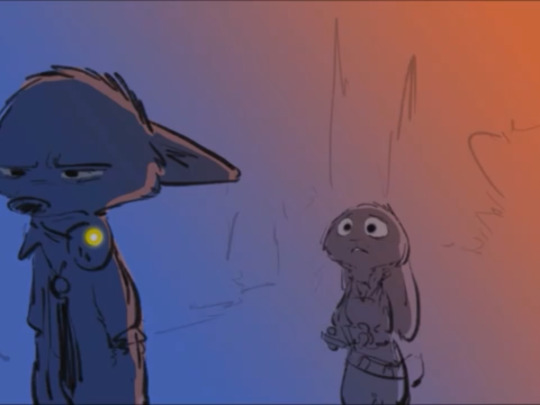
So, it sounds like people are largely positive on me doing some Zootopia posts on this blog, and I wanted to talk about this tweet I saw the other day:

I’ll punt on explaining why Beastars isn’t “Dark Zootopia”--that’s a great topic for another post. But I would like to talk about why this popular yet stridently uninformed tweet is so, so wrong. Why the shock collar draft was not better, actually.
And obviously, I’m not writing several pages in reply to a single tweet--this is a take that’s been around since the movie came out, that the “original version was better.” It’s been wrong the whole time.
Let’s talk about why!
Part 1: “Because Disney”
Let’s start with this--the assumption that the film’s creators wanted to make this shock collar story and “Disney” told them to change it.
That’s not how it works.
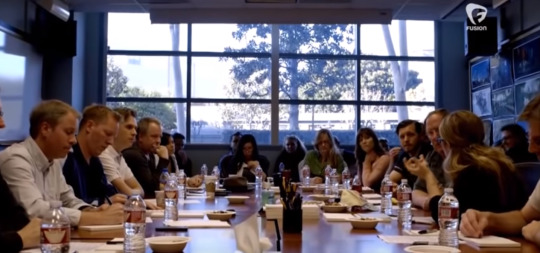
I try to keep stuff about me out of these posts as much as possible, but just for a bit of background, I’ve worked in the animation industry for about half a decade. I know people at Disney. I have a reasonable idea of how things are there.
There is this misconception about creative industries that they’re constantly this pitched battle of wills between creative auteurs trying to make incredible art and ignorant corporate suits trying to repress them.
That can happen, especially in dysfunctional studios (and boy could I tell some stories) but Walt Disney Animation Studios is not dysfunctional. It’s one of the most autonomous and well-treated parts of the Disney Company.
The director of Zootopia, Byron Howard, isn’t an edgelord. He made Bolt and Tangled. He knows what his audience is, and he’s responsible enough not to spend a year (and millions of dollars in budget) developing a grimdark Don Bluth story that leadership would never approve. It wouldn’t just be a waste of time--he would be endangering the livelihoods of the hundreds of people working under him. Meanwhile, Disney Animation’s corporate leadership trusts their talent. They don’t generally interfere with story development because they don’t need to. Because they employ people like Byron Howard.
Howard and the other creative leads of Zootopia have said a dozen times, in interviews and documentaries, that they gave up on the shock collar idea because it wasn’t working. They’ve explained their reasoning in detail. Maybe they’re leaving out some of the story, but in general? I believe them.
But Beastars Takes, you say, maybe even if Disney didn’t force them to back away from this darker version, it still would have been better?
Part 2: Why Shock Collars Seem Good
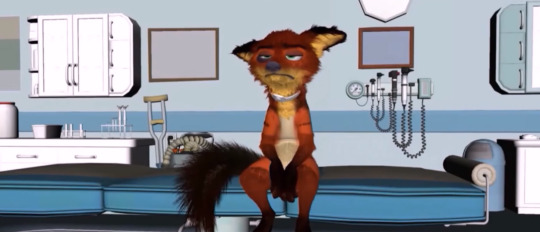
I will say this--I completely sympathize with people who see these storyboards and scenes from earlier versions of the movie and think “this seems amazing.” It does! A lot of these drawings and shots are heartbreakingly good, in isolation.

I love these boards. They make me want to cry. I literally have this drawing framed on my wall. Believe me, I get it.
But the only reason we care this much about this alternative draft of Zootopia is that the Zootopia we got made us love this world and these characters. You know what actually made me cry?

Oh, yeah.
So let’s set aside the astonishing hubris of insisting Zootopia’s story team abandoned the “good” version of the story, when the “bad version” is the most critically-acclaimed Disney animated feature in the past SIXTY YEARS.
“But Beastars Takes!” I hear you say. “Critics are idiots and just because something’s popular doesn’t make it good!”
Fair enough. Let’s talk about why the real movie is better.
Part 3: The Message (it is, in fact, like a jungle sometimes)
This type of thing is always hard to discuss, in the main--a lot of people don’t want to feel criticized or “called out” by the entertainment they consume, and they don’t want to be asked to think about their moral responsibilities. But it’s hard to deny that Zootopia is a movie with a strong point of view. Everything else--the characters, the worldbuilding, the plot, grows out from the movie’s central statement about bias.

And the movie we got, with no shock collars, makes that statement far more effectively.
To dive into the full scope of Zootopia’s worldview and politics (warts and all) would be a whole post on its own, so I’ll just summarize the key point of relevance here:
Zootopia's moral message is that you, the viewer, need to confront your own biases. Not yell at someone else. No matter how much of a good or progressive person you consider yourself to be--if you want to stand against prejudice you have to start with yourself.
That’s a tough sell! For that message to land, we need to see ourselves in the protagonist.
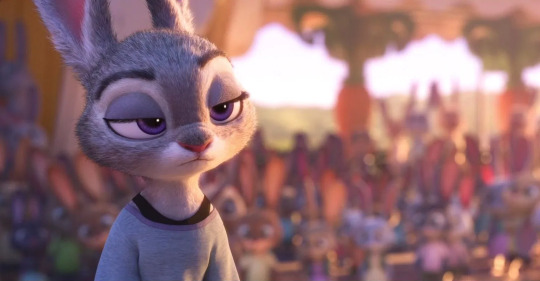
Judy’s a good person! She argues with her dad about foxes. She knows predators aren’t all dangerous. She’s not speciesist. Right?
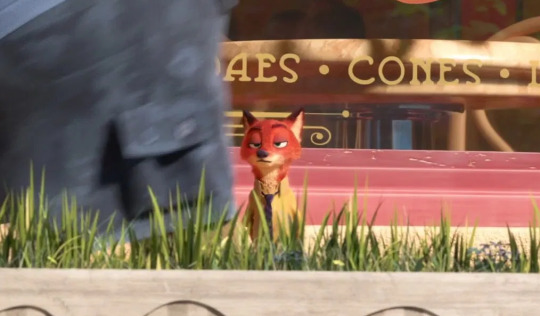
Ah fuck.
Let’s fast-forward to the pivotal scene of this movie. In an unfortunate but inevitable confluence of circumstances, Judy’s own biases and prejudiced assumptions come out, and she shits the bad.
Nick, who’s already bared his soul to her (against his better instincts), is heartbroken. But not as heartbroken as he is a minute later when he tries to confront her about what she’s said, and she makes this face:
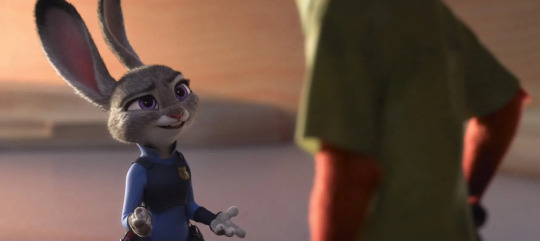
Whaaaat? Come on, Nick. I’m a good person. Why are you giving me a hard time?
People like to complain about this scene. That it’s a hackneyed “misunderstanding” trope that could be easily resolved with a discussion. They’re wrong. Nick tries to have a discussion. She blows him off.
This isn’t Judy acting out of character, this is her character. Someone who identifies as Not A Racist, and hasn’t given the issue any more thought. This is not only completely believable characterization (who hasn’t seen someone react this way when you told them they hurt you?) it’s the film’s central thesis!
Yes, Nick somewhat provokes her into reaching for her “fox spray,” and her own trauma factors in there, but she’s already made her fatal mistake before that happens.
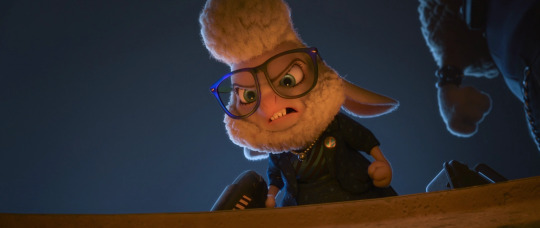
(As an aside, people also make the criticism that the movie unrealistically deflects responsibility for racism onto Bellwether and her plot. It doesn’t. All the key expressions of prejudice in the film--Judy’s encounter with Gideon, her parents’ warnings, the elephant in the ice cream shop, Judy’s early encounters with Bogo, Judy's views on race science--exist largely outside of Bellwether’s influence. She is a demagogue who inflames existing tensions, she didn’t invent them. Bogo literally says “the world has always been broken.”)
So, anyway. But we love Judy. She’s an angel. She also kinda sucks! She’s proudly unprejudiced, and when her own prejudice is pointed out to her she argues and doesn’t take it seriously. This is bad, but it’s also a very human reaction. It’s one most of us have probably been guilty of at one point or another.
Look at Zootopia’s society, too--it’s shiny and cosmopolitan, seemingly idyllic. Anyone can be anything, on paper. But scratch too deep beneath the surface and there’s a lot of pain and resentment here, things nobody respectable would say in public but come out behind closed doors, or among family, when nobody’s watching. It’s entirely recognizable--at least to me, someone who lives in a large liberal city in the United States. Like Byron Howard.
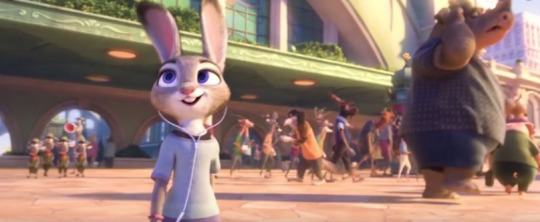
Wow, this place is a paradise!
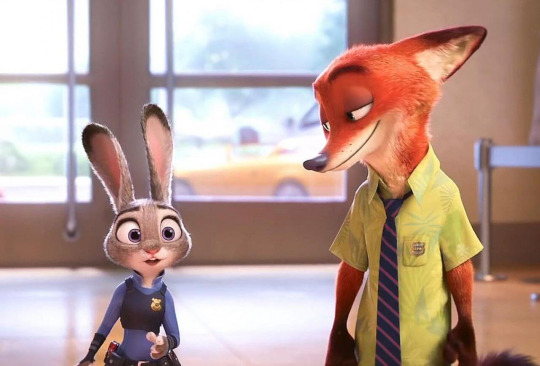
Wait, what’s a “NIMBY”?
Part 4: Why Shock Collars Are Bad
So, with the film’s conceit established, let’s circle back to the shock collar idea. Like I said, it’s heartbreaking. It’s dramatic. It’s affective.
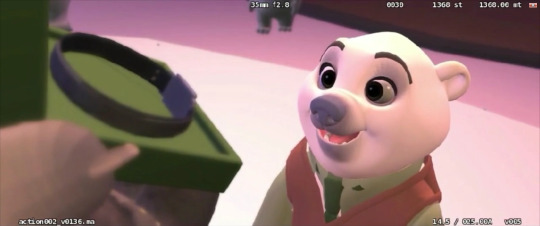
It also teaches us nothing.
If I see a movie where predator animals are subjected to 24/7 electroshock therapy, I don’t think “wow, this makes me want to think about how I could do better by the people around me.” I think “damn that shit’s crazy lmao. that’d be fucked up if that happened.” At a stretch, it reminds me of something like the Jim Crow era, or the Shoah. You know, stuff in the Past. Stuff we’ve all decided couldn’t ever happen again, so why worry about it?
The directors have said this exact thing, just politely. “It didn’t feel contemporary,” they say in pressers. That’s what it means.
If anything, the shock collar draft reifies the mindset that Zootopia is trying to reject--it shows us that discrimination is blatant, and dramatic, and flagrantly cruel, and impossible to miss.

And...that’s not true. If you only look for bias at its most malicious and evil, you’re going to miss the other 95 percent.
The messaging of this “darker version” is--ironically--less mature, less insightful, less intelligent. Less useful. Darker’s not better.
Part 5: Why Shock Collars Are Still Bad
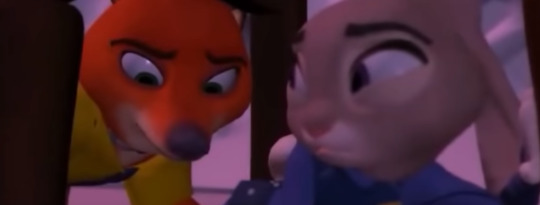
So what if you don’t care about the message? What if you have no interest in self-reflection, or critical analysis (why are you reading this blog then lmao)? What if you just really want to hear a fun story about talking animals?
Well, this is trickier, because the remaining reasons are pretty subjective and emotional.
The creators have said that the shock collar version didn’t work because the viewers hated the cruel world they’d created. They agreed with Nick--the city was beyond saving. They didn’t want to save it.
The creators have said that Judy was hard to sympathize with, not being able to recognize the shock collars for the obvious cruelty they were.

Fuck you, Judy!
But we haven’t seen the draft copies. We haven’t watched the animatics. We have to take their word for it. Anyone who’s sufficiently invested in this story is going to say “well, I disagree with them.” It doesn’t matter to them that they haven’t seen the draft and the filmmakers have. The movie they’ve imagined is great and nobody is going to convince them otherwise.
But the fact remains that the shock collar movie, as written, did not work. And, if behind the scenes material is to be believed, it continued to not work after months and months of story doctoring.
There’s even been a webcomic made out of the dystopian version of Zootopia. It’s clever and creative and well-written and entertaining and...it kind of falls apart. The creator, after more than a little shit-talk directed at Disney, abandoned the story before reaching the conclusion, but even before then the seams were beginning to show. How do you take a society that’s okay with electrocuting cute animals and bring it to a point of cathartic redemption? You can’t, really. The story doesn’t work.

Does that mean people shouldn’t make fanworks out of the cut material? That they shouldn’t be inspired and excited by it? Hell no. This drawing is cute as hell. The ideas are compelling.
But I suppose what I’d ask of you all is--if you’re weighing the hot takes of art students on Twitter against the explanations of veteran filmmakers, consider that the latter group might actually know what they’re talking about.
See you next time!
382 notes
·
View notes